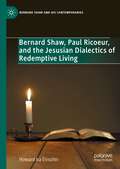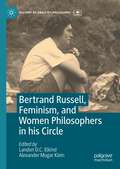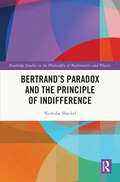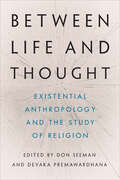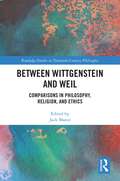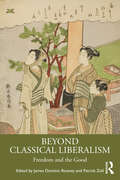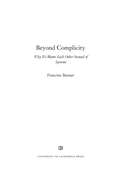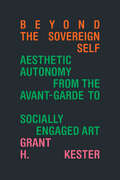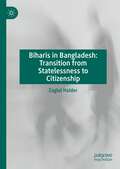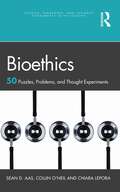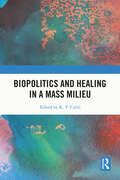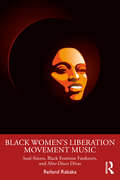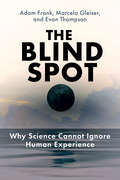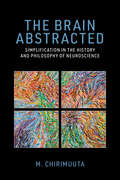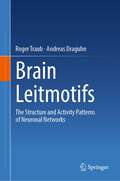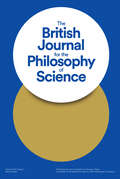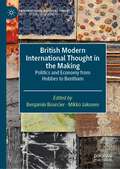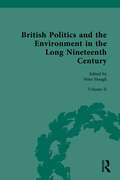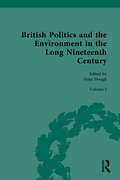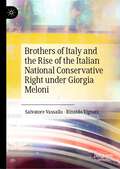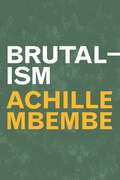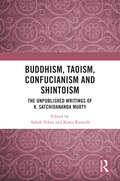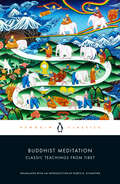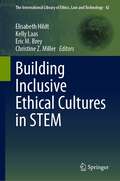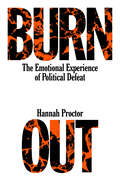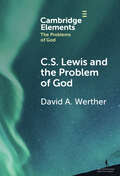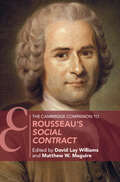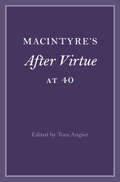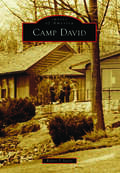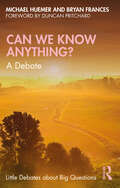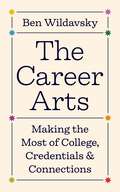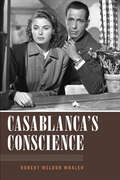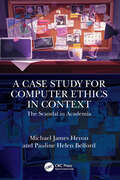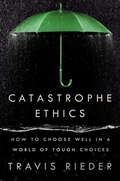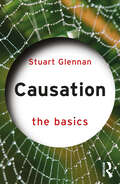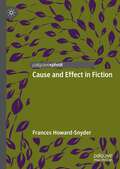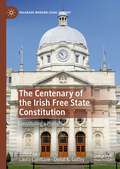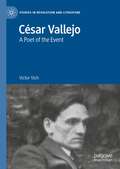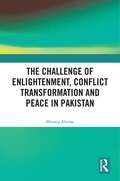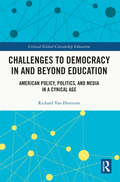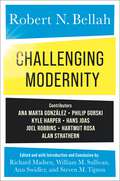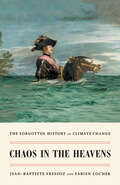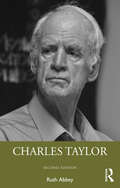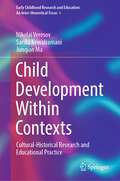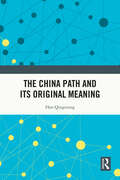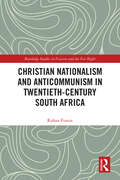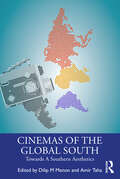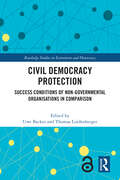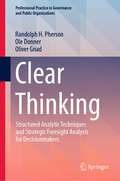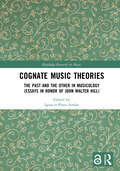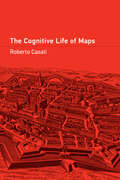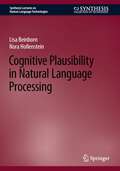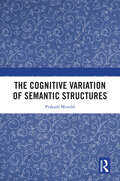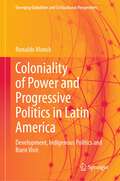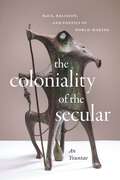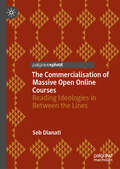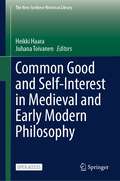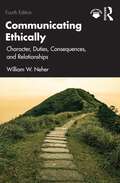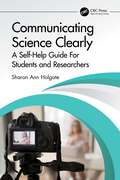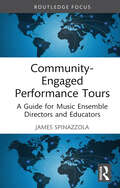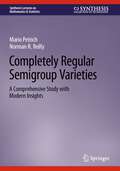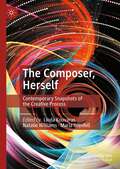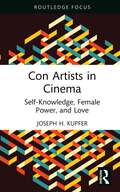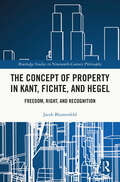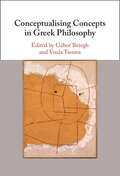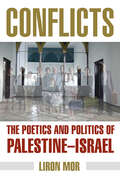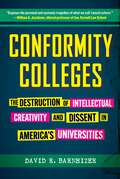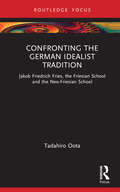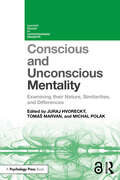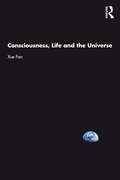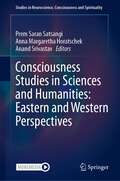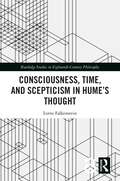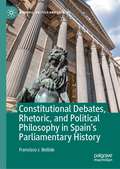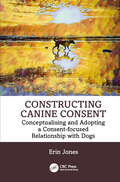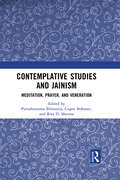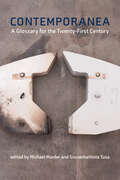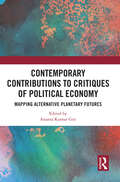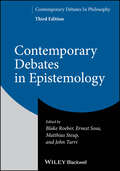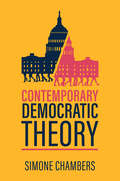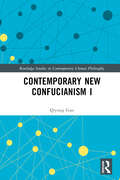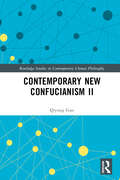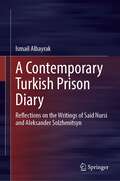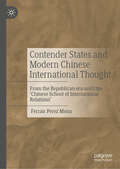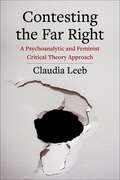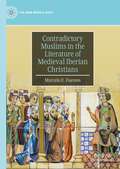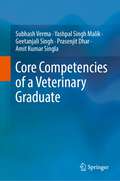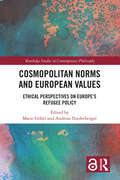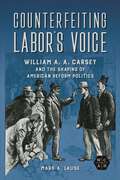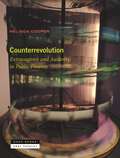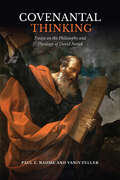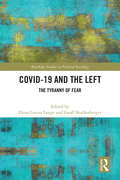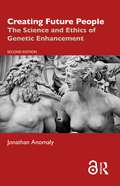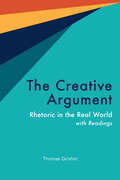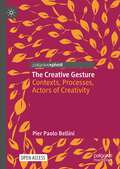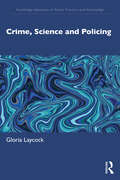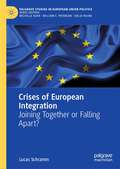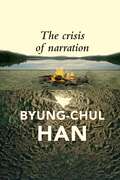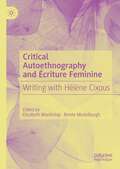- Table View
- List View
Bernard Shaw, Paul Ricoeur, and the Jesusian Dialectics of Redemptive Living (Bernard Shaw and His Contemporaries)
by Howard Ira EinsohnThis book explores a heretofore unremarked linkage between Bernard Shaw, the twentieth-century French thinker Paul Ricoeur, and Jesus of Nazareth. The ties that bind them are a foundational interest in the social teachings of the Nazarene and their use of a shared dialectics with respect to living the kind of compassionate life that holds out the promise in our contemporary world of achieving something approximating universal wellness on a healthy planet at peace with itself. This work argues that the three principal subjects of the study—independently of one another—used the same dialectical method to reach the same dialectically derived conclusion about how humans can live redemptively in a fractured world.
Bertrand Russell, Feminism, and Women Philosophers in his Circle (History of Analytic Philosophy)
by Landon D. C. Elkind Alexander Mugar KleinThis book examines Bertrand Russell’s complicated relationships to the women around him, and to feminism more generally. The essays in this volume offer scholarly reassessments of these relationships and their import for the history of feminism and of analytic philosophy.Russell is a founder of analytic philosophy. He has also been called a feminist due to his public, decades-long advocacy for women’s rights and equality of the sexes. But his private behavior towards wives and sexual partners, and his apparently dismissive (occasionally public) responses to some women philosophers, raises the question of what sort of feminist (or chauvinist) Russell actually was.Focusing on women in Russell’s circle of acquaintance, including feminist activists and his philosophical interlocutors, this book casts new light on a timeless thinker’s feminism and the women who played critical roles in the making of analytic philosophy.
Bertrand’s Paradox and the Principle of Indifference (Routledge Studies in the Philosophy of Mathematics and Physics)
by Nicholas ShackelEvents between which we have no epistemic reason to discriminate have equal epistemic probabilities. Bertrand’s chord paradox, however, appears to show this to be false, and thereby poses a general threat to probabilities for continuum sized state spaces. Articulating the nature of such spaces involves some deep mathematics and that is perhaps why the recent literature on Bertrand’s Paradox has been almost entirely from mathematicians and physicists, who have often deployed elegant mathematics of considerable sophistication. At the same time, the philosophy of probability has been left out. In particular, left out entirely are the philosophical ground of the principle of indifference, the nature of the principle itself, the stringent constraint this places on the mathematical representation of the principle needed for its application to continuum sized event spaces, and what these entail for rigour in developing the paradox itself. This book puts the philosophy and its entailments back in and in so doing casts a new light on the paradox, giving original analyses of the paradox, its possible solutions, the source of the paradox, the philosophical errors we make in attempting to solve it and what the paradox proves for the philosophy of probability. The book finishes with the author’s proposed solution—a solution in the spirit of Bertrand’s, indeed—in which an epistemic principle more general than the principle of indifference offers a principled restriction of the domain of the principle of indifference.Bertrand's Paradox and the Principle of Indifference will appeal to scholars and advanced students working in the philosophy of mathematics, epistemology, philosophy of science, probability theory and mathematical physics.
Between Life and Thought: Existential Anthropology and the Study of Religion
by Don Seeman Devaka PremawardhanaExistential anthropology is an approach inspired by existential and phenomenological thought to further our understanding of the human condition. Its ethnographic methodology emphasizes embodied experience and focuses on what is at stake for people amid the contingencies, struggles, and uncertainties of everyday life. While anthropological research on religion abounds, there has been little systematic attention to the ways anthropology and religious studies might benefit from better consideration of one another or from the adoption of a shared existential perspective. Between Life and Thought gathers leading anthropologists and religion scholars, including some of existential anthropology’s most recognized advocates and thoughtful critics. The collection opens with a comprehensive introduction to phenomenology and existentialism in anthropology and religious studies and concludes with an analysis of how existential anthropology might address the long-standing problem of constructivism and perennialism in religious studies. The chapters altogether present existential anthropology as an especially generative paradigm with which to rethink and remake both anthropology and the academic study of religion. A timely and significant intervention across multiple areas of research, Between Life and Thought is an invaluable source for critically exploring the prospects, as well as the limits, of an anthropological approach to religion grounded in experiential ethnography and existential thought.
Between Wittgenstein and Weil: Comparisons in Philosophy, Religion, and Ethics (Routledge Studies in Twentieth-Century Philosophy)
by Jack ManziThis volume explores the relationship between the philosophical thought of Simone Weil and Ludwig Wittgenstein. The contributions shed light on how reading Weil can inform our understanding of Wittgenstein, and vice versa. The chapters cover different aspects of Weil’s and Wittgenstein’s philosophy, including their religious thought and their views on ethics and metaphilosophy. They address the following questions: How does Wittgenstein’s struggle with religious belief match up with Simone Weil’s own struggle with organised belief? What is the role of the mystical and supernatural in their works? How much impact has various posthumous editorial decisions had on the shaping of Weil’s and Wittgenstein’s thought? Is there any significance to similarities in Weil’s and Wittgenstein’s written and philosophical styles? How do Weil and Wittgenstein conceive of the ‘self’ and its role in philosophical thinking? What role does belief play in Weil’s and Wittgenstein’s respective philosophical works? Between Wittgenstein and Weil will be of interest to scholars and advanced students working in twentieth-century philosophy, philosophy of religion, philosophy of language, and the history of moral philosophy.
Beyond Classical Liberalism: Freedom and the Good
by James Dominic Rooney Patrick ZollThis volume brings together diverse sets of standpoints on liberalism in an era of growing skepticism and distrust regarding liberal institutions. The essays in the volume: • Relate concerns for liberal institutions with classical themes in perfectionist politics, such as the priority of the common good in decision-making or the role of comprehensive doctrines. • Analyse how perfectionist intuitions about the political life affect our concepts of public reason or public justification. • Outline various moral duties we have toward other persons that underlie the liberal institutions or notions of rights functioning across the contemporary political landscape. • Explore various aspects of pluralism from within influential religious or philosophical traditions, applying insights from those traditions to issues in contemporary politics. The comprehensive volume will be of great interest to scholars, students, and researchers of politics, especially those in political philosophy and political theory.
Beyond Complicity: Why We Blame Each Other Instead of Systems
by Francine BannerAn ambitious study of our obsession with complicity that shows how we can all become "good accomplices." Beyond Complicity is a fascinating cultural diagnosis that identifies our obsession with complicity as a symptom of a deeply divided society. The questions surrounding what it means to be legally complicit are the same ones we may ask ourselves as we evaluate our own and others' responsibility for inherited and ongoing harms, such as racism, sexism, and climate change: What does it mean that someone "knew" they were contributing to wrongdoing? How much involvement must a person have in order to be complicit? At what point are we obligated to intervene? Francine Banner ties together pop culture, politics, law, and social movements to provide a framework for thinking about what we know intuitively: that our society is defined by crisis, risk, and the quest to root out hazards at all costs. Engaging with legal cases, historical examples, and contemporary case studies, Beyond Complicity unfolds the complex role that complicity plays in US law and society today, offering suggestions for how to shift focus away from blame and toward positive, lasting systemic change.
Beyond the Sovereign Self: Aesthetic Autonomy from the Avant-Garde to Socially Engaged Art
by Grant KesterIn Beyond the Sovereign Self Grant H. Kester continues the critique of aesthetic autonomy begun in The Sovereign Self, showing how socially engaged art provides an alternative aesthetic with greater possibilities for critical practice. Instead of grounding art in its distance from the social, Kester shows how socially engaged art, developed in conjunction with forms of social or political resistance, encourages the creative capacity required for collective political transformation. Among others, Kester analyzes the work of conceptual artist Adrian Piper, experimental practices associated with the escrache tradition in Argentina, and indigenous Canadian artists such as Nadia Myre and Michèle Taïna Audette, showing how socially engaged art catalyzes forms of resistance that operate beyond the institutional art world. From the Americas and Europe to Iran and South Africa, Kester presents a historical genealogy of recent engaged art practices rooted in a deep history of cultural production, beginning with nineteenth-century political struggles and continuing into contemporary anticolonial resistance and other social movements.
Biharis in Bangladesh: Transition from Statelessness to Citizenship
by Zaglul HaiderThis book deals with the citizenship status of the Biharis in Bangladesh and their ability to access rights associated with citizenship. The main argument of the book is that although legally the Biharis are citizens of Bangladesh, they still do not have access to many important rights of citizenship that can make their citizenship meaningful. Their inability to access many important citizenship rights made them de facto stateless, although they are de-jure citizens. Taking a law and society approach this book examines both legal and non-legal factors behind the deplorable conditions of the Biharis in Bangladesh. Based on fieldwork, this book analyses that the Biharis’ inability to access citizenship rights is inconsistent with citizenship theory, citizenship laws, and the Constitution of Bangladesh. To make the Biharis citizenship effective or meaningful the author suggests some recommendations for policy changes that would enable Biharis to access rights associated with citizenship.
Bioethics: 50 Puzzles, Problems, and Thought Experiments (Puzzles, Paradoxes, and Thought Experiments in Philosophy)
by Sean D. Aas Collin O'Neil Chiara LeporaBioethics: 50 Puzzles, Problems, and Thought Experiments collects 50 cases—both real and imaginary—that have been, or should be, of special interest and importance to philosophical bioethics. Cases are collected together under topical headings in a natural order for an introductory course in bioethics. Each case is described in a few pages, which includes bioethical context, a concise narrative of the case itself, and a discussion of its importance, both for broader philosophical issues and for practical problems in clinical ethics and health policy. Each entry also contains a brief, annotated, list of suggested readings. In addition to the classic cases in bioethics, the book contains discussion of cases that involve several emerging bioethical issues: especially, issues around disability, social justice, and the practice of medicine in a diverse and globalized world.Key Features: Gives readers all chapters presented in an identical format: The Case Responses Suggested Readings Includes reference to up-to-date literature in journals devoted both to more generalist ethics and to bioethics Offers short and self-contained chapters, allowing students to quickly understand an issue and giving instructors flexibility in assigning readings to match the themes of the course Features actual or lightly fictionalized cases in humanitarian aid, offering a type of case that is often underrepresented in bioethics books Authored by three scholars who are actively involved in the central research areas of bioethics
Biopolitics and Healing in a Mass Milieu
by K. V. CybilSeveral of the key concepts of biopolitics have come under scrutiny since the outbreak of Covid-19 pandemic. This volume brings into discussion how biopolitics can be conceptualized critically within a milieu of mass healing, such as in India. Pouring through the decolonial lens of healing, contributors to this volume discuss crucial themes like geropolitics and pandemic reflections on the question of old age; borders and logistics in a world emerging from the pandemic; immunization of humans and humanization of immunity, thus defining the Indian contexts of the biopolitical problematic. Extending its analysis into a retrospective vision of thought traditions and socio-political underpinnings that shaped modernity and post-coloniality in India, it also explores the medico-therapeutical discourse embedded in philosophy of medicine and philosophical modernity tracing its interstitial positioning as therapeutic-assemblages in a milieu of mass healing. This book will be useful for scholars and researchers of biopolitics, philosophy, political philosophy, sociology, science and technology studies, medical sociology, health and well-being, and cultural studies.
Black Women's Liberation Movement Music: Soul Sisters, Black Feminist Funksters, and Afro-Disco Divas
by Reiland RabakaBlack Women’s Liberation Movement Music argues that the Black Women’s Liberation Movement of the mid-to-late 1960s and 1970s was a unique combination of Black political feminism, Black literary feminism, and Black musical feminism, among other forms of Black feminism. This book critically explores the ways the soundtracks of the Black Women’s Liberation Movement often overlapped with those of other 1960s and 1970s social, political, and cultural movements, such as the Black Power Movement, Women’s Liberation Movement, and Sexual Revolution. The soul, funk, and disco music of the Black Women’s Liberation Movement era is simultaneously interpreted as universalist, feminist (in a general sense), and Black female-focused. This music’s incredible ability to be interpreted in so many different ways speaks to the importance and power of Black women’s music and the fact that it has multiple meanings for a multitude of people. Within the worlds of both Black Popular Movement Studies and Black Popular Music Studies there has been a long-standing tendency to almost exclusively associate Black women’s music of the mid-to-late 1960s and 1970s with the Black male-dominated Black Power Movement or the White female-dominated Women’s Liberation Movement. However, this book reveals that much of the soul, funk, and disco performed by Black women was most often the very popular music of a very unpopular and unsung movement: The Black Women’s Liberation Movement. Black Women’s Liberation Movement Music is an invaluable resource for students, teachers, and researchers of Popular Music Studies, American Studies, African American Studies, Critical Race Studies, Gender Studies, and Sexuality Studies.
The Blind Spot: Why Science Cannot Ignore Human Experience
by Adam Frank Marcelo Gleiser Evan ThompsonA compelling argument for including the human perspective within science, and for how human experience makes science possible.&“This is by far the best book I've read this year.&” —Michael Pollan, Professor of the Practice of Non-fiction, Harvard University; #1 New York Times bestselling author&“(A) stimulating manifesto for changing the way we look at things.&” —Wall Street JournalIt&’s tempting to think that science gives us a God&’s-eye view of reality. But we neglect the place of human experience at our peril. In The Blind Spot, astrophysicist Adam Frank, theoretical physicist Marcelo Gleiser, and philosopher Evan Thompson call for a revolutionary scientific worldview, where science includes—rather than ignores or tries not to see—humanity&’s lived experience as an inescapable part of our search for objective truth. The authors present science not as discovering an absolute reality but rather as a highly refined, constantly evolving form of human experience. They urge practitioners to reframe how science works for the sake of our future in the face of the planetary climate crisis and increasing science denialism.Since the dawn of the Enlightenment, humanity has looked to science to tell us who we are, where we come from, and where we&’re going, but we&’ve gotten stuck thinking we can know the universe from outside our position in it. When we try to understand reality only through external physical things imagined from this outside position, we lose sight of the necessity of experience. This is the Blind Spot, which the authors show lies behind our scientific conundrums about time and the origin of the universe, quantum physics, life, AI and the mind, consciousness, and Earth as a planetary system. The authors propose an alternative vision: scientific knowledge is a self-correcting narrative made from the world and our experience of it evolving together. To finally &“see&” the Blind Spot is to awaken from a delusion of absolute knowledge and to see how reality and experience intertwine.The Blind Spot goes where no science book goes, urging us to create a new scientific culture that views ourselves both as an expression of nature and as a source of nature&’s self-understanding, so that humanity can flourish in the new millennium.
The Brain Abstracted: Simplification in the History and Philosophy of Neuroscience
by M. ChirimuutaAn exciting, new framework for interpreting the philosophical significance of neuroscience.All science needs to simplify, but when the object of research is something as complicated as the brain, this challenge can stretch the limits of scientific possibility. In fact, in The Brain Abstracted, an avowedly &“opinionated&” history of neuroscience, M. Chirimuuta argues that, due to the brain&’s complexity, neuroscientific theories have only captured partial truths—and &“neurophilosophy&” is unlikely to be achieved. Looking at the theory and practice of neuroscience, both past and present, Chirimuuta shows how the science has been shaped by the problem of brain complexity and the need, in science, to make things as simple as possible. From this history, Chirimuuta draws lessons for debates in philosophy of science over the limits and definition of science and in philosophy of mind over explanations of consciousness and the mind-body problem.The Brain Abstracted is the product of a historical rupture that has become visible in the twenty-first century, between the &“classical&” scientific approach, which seeks simple, intelligible principles underlying the manifest complexity of nature, and a data-driven engineering approach, which dispenses with the search for elegant, explanatory laws and models. In the space created by this rupture, Chirimuuta finds grounds for theoretical and practical humility. Her aim in The Brain Abstracted is not to reform neuroscience, or offer advice to neuroscientists, but rather to interpret their work—and to suggest a new framework for interpreting the philosophical significance of neuroscience.
Brain Leitmotifs: The Structure and Activity Patterns of Neuronal Networks
by Roger Traub Andreas DraguhnThis book tackles the question of why the brain is so difficult to fully understand. In neuroscience, data are acquired and analyzed with astonishing techniques and accumulate rapidly. Nevertheless, try to explain how a person can think or why there is such a condition as schizophrenia, and it appears that we really know little. To approach these difficulties, the authors first present a number of case studies in which the operation of a neural circuit is worked out in some detail and, at the same time, the functional significance of the operation is also understood. These examples are complicated in their biologic specifics but are conceptually straightforward. The examples are hoped to provoke an appreciation for what neuroscience can accomplish. The authors then develop some thoughts on how these issues can be addressed----instead of considering cognition in general, taking instead a subset of cognition that does lend itself to formal description.
Britain and the Dhofar War in Oman, 1963–1976: A Covert War in Arabia (Security, Conflict and Cooperation in the Contemporary World)
by Geraint HughesThis book explores Britain’s involvement in the Dhofar War of 1963-1976, focusing on the military aspects of this conflict in Southern Oman. It reveals how both the Conservative and Labour governments in office during this time provided military and security assistance to Oman’s rulers without parliamentary or press scrutiny. Based on archival material and witness accounts, as well as existing secondary source literature and memoirs, this study provides new insights into Britain’s clandestine embroilment in the Dhofar War, an often overlooked but historically significant intervention in the Middle East. This book will be a valuable resource for scholars and students interested in the complex and often controversial history of Britain’s involvement in Middle Eastern politics in the post-colonial period.
The British Journal for the Philosophy of Science, volume 75 number 1 (March 2024)
by The British Journal for the Philosophy of ScienceThis is volume 75 issue 1 of The British Journal for the Philosophy of Science. Since 1950, The British Journal for the Philosophy of Science (BJPS) has presented the best new work in the discipline. An international leader in the philosophy of science, BJPS showcases outstanding research on a variety of topics, from the nature of models and simulations to mathematical explanation and foundational issues in the physical, life, and social sciences. Published on behalf of the British Society for the Philosophy of Science, the journal offers innovative and thought-provoking papers that open up new areas of inquiry or shed new light on well-known issues.
British Modern International Thought in the Making: Politics and Economy from Hobbes to Bentham (International Political Theory)
by Benjamin Bourcier Mikko JakonenThis book articulates international political theory in dialogue with economics on several questions. It asks: how has modern international theory been adjusted and nourished by economic ideas, theories and practices? How far has the distinctive contribution of some theorists to international theory been informed by their views on economy? What has been the impact of the theory of the state for economic and international theory? What sort of economic thinking has led to revise the debates constitutive for the modern international realm? How have economic debates been rhetorically connected to political debates in the field of international relations?
British Politics and the Environment in the Long Nineteenth Century: Volume II - Regulating Nature and Conquering Nature
by Peter HoughThis collection of archival source material chronicles British environmental politics between 1789 and 1914. This text examines the ways in which environmental issues were managed artistically and socially, as well as politically. Accompanied by extensive editorial commentary, this collection will be of great interest to students of environmental and political history.
British Politics and the Environment in the Long Nineteenth Century: Volume I - Discovering Nature and Romanticizing Nature
by Peter HoughThis volume of archival source material chronicles British environmental politics between 1789 and 1914. This text examines scientific discoveries during this period and the result of these findings on the political environment, bringing the publics attention to public health issues such as acid rain and river pollution. Accompanied by extensive editorial commentary, this collection will be of great interest to students of environmental and political history.
Brothers of Italy and the Rise of the Italian National Conservative Right under Giorgia Meloni
by Salvatore Vassallo Rinaldo VignatiThis book is an in-depth study of Fratelli d’Italia, the party led by Italian Prime Minister Giorgia Meloni. After providing a concise history of the neo-fascist and post-fascist parties to which Fratelli d’Italia is heir, the book examines its founding, statutory rules and internal organisation. The authors explore Meloni’s communication style and the national conservative ideology she has embraced, Fratelli d’Italia’s international network of alliances and its place in EU politics, and the composition of the electorate that led to the success of her and the party in the 2022 parliamentary elections. Through well-documented, rigorous and impartial analysis, the book offers insights into the path Fratelli d’Italia has taken and the identity it has built in its first ten years – explaining why a political tradition that seemed destined for extinction has come to power and is now attempting to change coalition politics in the EU. In doing so, the authors challenge several entrenched assumptions about populist and radical right-wing parties. The Italian edition of the book was reviewed in national newspapers and other media, garnering praise from a wide range of political perspectives.
Brutalism (Theory in Forms)
by Achille MbembeIn Brutalism, eminent social and critical theorist Achille Mbembe invokes the architectural aesthetic of brutalism to describe our moment, caught up in the pathos of demolition and production on a planetary scale. Just as brutalist architecture creates an affect of overwhelming weight and destruction, Mbembe contends that contemporary capitalism crushes and dominates all spheres of existence. In our digital, technologically focused era, capitalism has produced a becoming-artificial of humanity and the becoming-human of machines. This blurring of the natural and artificial presents a planetary existential threat in which contemporary society’s goal is to precipitate the mutation of the human species into a condition that is at once plastic and synthetic. Mbembe argues that Afro-diasporic thought presents the only solution for breaking the totalizing logic of contemporary capitalism: repairing that which is broken, developing a new planetary consciousness, and reforming a community of humans in solidarity with all living things.
Buddhism, Taoism, Confucianism and Shintoism: The Unpublished Writings of K. Satchidananda Murty
by Ashok Vohra and Kotta RameshK. Satchidananda Murty (1924-2011) was a vociferous writer and an iconoclast. This volume is a collection of his unpublished writings in philosophy. It features Murty's essays on Buddhism, Taoism, Confucianism and Shintoism. The texts study the origins of Indian, Chinese, and Japanese philosophical traditions and provide a comparative study of the different schools of thought. Murty analyses the development of science in the ancient Indian tradition, especially in the areas of geometry, algebra, architecture, engineering, and astronomy. He also provides recommendations for promoting Asian philosophies and cultures to the world, without dependence on the West. An important contribution, the book presents K. Satchidananda Murty's contribution to philosophy during sixty-one years of his engagement with active writing and teaching. It will be of great interest to scholars, teachers, and students of Indian philosophy, Hindu philosophy, comparative philosophy, Asian Philosophy, religious studies, and South Asian studies.
Buddhist Meditation: Classic Teachings from Tibet
by Kurtis R. SchaefferA Tibetan Buddhist anthology of accessible and authentic contemplative exercises to help cultivate innate yet undeveloped powers of mind, emotion, and body. A Penguin Classic Drawn from Tibet's rich contemplative literature, Buddhist Meditation offers classic exercises focused on the opportunities and challenges of life; cultivating inner calm; fostering a wider perspective on oneself in relationship to others; working with negative emotions, and the highest values of the Buddhist tradition, love and compassion. Several dozen meditation instructions are collected in twelve chapters. All major traditions of Tibetan Buddhism are represented. The book is structured on "foundation practices", practice manuals that immerse the reader in the search for meaningful and compassionate responses to the ubiquity of human suffering, and in the contemplative techniques that translate that search into consequential action. Spiritual exercises introduce 1) the opportunity for self-betterment and to be of benefit to other living beings; 2) the inescapable persistence of suffering in life, and the reality of death; 3) the workings of ethical cause and effect, otherwise known as karma; and 4) the ever-repeating succession of frustration known as cyclic existence, or samsara. The second set of foundation practices provide tools to build upon including: 5) taking refuge in Buddhism—a deep formal commitment to integrate Buddhist contemplative and ethical teachings into one's life; 6) cultivating love and compassion for all living beings; 7) clearing away cognitive, emotional, and behavioral impediments to actualizing love and compassion; 8) developing with wisdom and the experience and excellent qualities necessary to put love and compassion into practice; and 9) dedicating oneself to a spiritual mentor to serve as a guide through this intensive program of training. Part existential philosophy, part ethics, part self-help program, part cosmology—the foundation exercises present a complete Buddhist picture of life, the ethical universe, and the first steps in making a positive impact in life for ourselves and others, steps anyone can begin to take by dedicating themselves to train in contemplative exercises.
Building Inclusive Ethical Cultures in STEM (The International Library of Ethics, Law and Technology #42)
by Elisabeth Hildt Kelly Laas Eric M. Brey Christine Z. MillerThis book shares innovative approaches to effectively engage students and faculty working in research labs, lab-based classrooms and courses to build inclusive ethical cultures. The frameworks and approaches presented move beyond traditional research ethics training to strengthen the ethical culture in research labs. The chapters in the book showcase best practices and approaches to embedding educational interventions in courses, research labs and departments. The book is based on the two-day workshop “Building Inclusive Ethical Cultures in STEM” (April 23-24, 2021). Moving beyond the two-day conference that inspired this collected volume, the various chapters address questions like: What are approaches and tools to integrate ethics education in STEM effectively? How can STEM ethics education be improved? What can researchers do to build more inclusive research environments? How can meaningful discussions about ethics be effectively integrated into STEM courses, research labs, and workplace environments? While each chapter takes a different perspective and is located in its respective context, the contributions are united by the goal of effectively including ethical reflection in STEM education. Instructors from both four-year and two-year colleges who teach STEM and lab-based STEM courses; young principal investigators/junior faculty who are in the process of building their research groups; departmental chairs interested in programmatic approaches for improving mentoring, research ethics education, and the research culture of their department, will find this work to be a very valuable resource in their daily practice.
Burnout: The Emotional Experience of Political Defeat
by Hannah Proctor"Hannah Proctor takes that feeling we all have, and names it again and again, helping us to resee the past and present of revolutionary struggle. A must-read."–Hannah Zeavin, Founding Editor, Parapraxis How to maintain hope in the face of despairIn the struggle for a better world, setbacks are inevitable. Defeat can feel overwhelming at times, but it has to be endured. How then do the people on the front line keep going? To answer that question and to help readers roll with the punches, Hannah Proctor draws on historical resources to find out how revolutionaries and activists of the past kept a grip on hope.Burnout considers former Communards exiled to a penal colony in the South Pacific; a young Bolshevik fleeing the city in despair; an ex-militant on the analyst&’s couch relating dreams of ruined landscapes; a trade union organiser seeking advice from a spiritual healer; and a group of feminists padding a room with mattresses to scream about the patriarchy. Jettisoning therapy talk and its stranglehold on our language, Proctor offers a different way forward - neither denial nor despair. Her cogent exploration of the ways militants make sense of their own burnout demonstrates that it is possible to mourn and organise at once, and to do both without compromise.
C.S. Lewis and the Problem of God (Elements in the Problems of God)
by null David WertherUnderstanding C.S. Lewis's vocation is essential for reading his works well, as is knowing how he came to it: his long and winding philosophical journey and reoccurring experiences of 'Joy.' Lewis discounted 'proofs' in philosophical theology but offered key arguments in support of theism per se, and Christianity in particular. His account of “mere Christianity” shows the centrality of self-determination, an emphasis on Christ's human nature, and a relativizing of atonement theories. Finally, Lewis's understanding of faith, his attempts to make sense of petitionary and imprecatory prayers, and his emphasis on theosis/deification, are considered.
The Cambridge Companion to Rousseau's Social Contract (Cambridge Companions to Philosophy)
by David Lay Williams Matthew W. MaguireWhat is freedom? What is equality? And what is sovereignty? A foundational text of modern political philosophy, Rousseau's Social Contract has generated much debate and exerted extraordinary influence not only on political thought, but also modern political history, by way of the French Revolution and other political events, ideals, and practices. The Social Contract is regularly studied in undergraduate courses of philosophy, political thought, and modern intellectual history, as well as being the subject of graduate seminars in numerous disciplines. The book inspires an ongoing flow of scholarly articles and monographs. Few texts have offered more influential and important answers to research questions than Rousseau's Social Contract, and in this new Cambridge Companion, a multidisciplinary team of contributors provides new ways to navigate this masterpiece of political philosophy- and its animating questions.
Cambridge Philosophical Anniversaries: MacIntyre’s After Virtue at 40 (Cambridge Philosophical Anniversaries Ser.)
by Tom AngierCamp David (Images of America)
by Robert P. SavittOriginally named Shangri-La by Franklin D. Roosevelt, today's Camp David was a well-guarded secret until its existence was revealed after World War II. A US Naval facility set on a mountaintop, Camp David's tight security has piqued the curiosity of Americans and foreigners. Prior to the outbreak of war, Roosevelt had access to the nearby presidential yacht as a "getaway" to escape the pressures of life in the White House. After a brief search of nearby locations, a site on Catoctin Mountain in Maryland was chosen as the place for the presidential retreat. It remained Shangri La until President Eisenhower said the name was "just a little fancy for a Kansas farm boy" and renamed it Camp David after his father and grandson in 1953. It has served as retreat for each succeeding president and, in addition to providing rest and relaxation, has been the setting of several historic meetings. Robert P. Savitt writes and lectures on a variety of historical subjects. He holds a doctoral degree from Georgetown University, served in the Departments of Defense and State, and was legislative director for a US senator. Savitt has authored three previous Arcadia Publishing titles.
Can We Know Anything?: A Debate (Little Debates about Big Questions)
by Bryan Frances Michael HuemerIn this book, Michael Huemer and Bryan Frances debate whether – and how – we can gain knowledge of the world outside of our own minds. Starting with opening statements, the debate moves through two rounds of replies. Frances argues that we lack knowledge because, for example, we cannot rule out the possibility that we are brains in vats being artificially stimulated in such a way as to create an illusion of living in the real world. Huemer disagrees that we need evidence against such possibilities in order to gain knowledge of the external world, maintaining instead that we are entitled to presume that things are as they appear unless and until we acquire specific grounds for thinking otherwise. The authors go on to discuss how one should think about controversial issues wherein the experts persistently disagree. Frances argues that we should generally withhold judgment about such issues or at least greatly reduce our confidence. Huemer agrees that people are often overconfident about controversial issues but tries to carve out exceptions wherein one can rationally hold on to controversial views. Accessible whilst also detailed and substantial, this thoughtful debate is suitable for readers at all levels, from those encountering the topic for the first time through those who are deeply familiar with the issues. Key Features: Showcases arguments from two leading philosophers in standard form and in clear language Presents definitions in an easily accessible form Summary boxes recap key arguments Includes an annotated bibliography and glossary of all specialized vocabulary
Capital of Mind: The Idea of a Modern American University
by Adam NelsonThe second volume of an ambitious new economic history of American higher education. Capital of Mind is the second volume in a breathtakingly ambitious new economic history of American higher education. Picking up from the first volume, Exchange of Ideas, Adam R. Nelson looks at the early decades of the nineteenth century, explaining how the idea of the modern university arose from a set of institutional and ideological reforms designed to foster the mass production and mass consumption of knowledge. This “industrialization of ideas” mirrored the industrialization of the American economy and catered to the demands of a new industrial middle class for practical and professional education. From Harvard in the north to the University of Virginia in the south, new experiments with the idea of a university elicited intense debate about the role of scholarship in national development and international competition, and whether higher education should be supported by public funds, especially in periods of fiscal austerity. The history of capitalism and the history of the university, Nelson reveals, are intimately intertwined—which raises a host of important questions that remain salient today. How do we understand knowledge and education as commercial goods? Should they be public or private? Who should pay for them? And, fundamentally, what is the optimal system of higher education for a capitalist democracy?
The Career Arts: Making the Most of College, Credentials, and Connections
by Ben WildavskyA persuasive case for building career success through broad education, targeted skills, and social capitalYoung people coming out of high school today can expect to hold many jobs over the course of their lives, which is why they need a range of essential skills. The Career Arts provides a corrective to the widespread and misleading notion that there is a direct trade-off between going to college and acquiring practical job skills. Ben Wildavsky cuts through the noise and anxiety surrounding this issue to offer sensible, clear-eyed guidance for anyone who is making decisions about education and career preparation with a view to getting ahead in the workforce.Drawing on evidence-based research, illuminating case studies, and in-depth interviews, Wildavsky shares the most vital lessons of what he calls the career arts, which include cultivating a mix of broad and targeted skills, taking advantage of employer-funded education benefits, and preparing for the world as it is, not as you wish it could be. He explains why college remains the gold standard of credentials, and presents the most promising high-quality supplements and alternatives to college that can help learners combine general and job-specific skills. He shows how building social capital is also critical to success, particularly for disadvantaged students.An invaluable guidebook for students, parents, counselors, and educators, The Career Arts reveals why college education and job preparation are not either-or propositions and identifies the blend of education and networking needed to support real-world career aspirations.
Casablanca's Conscience
by Robert Weldon WhalenA new look at a beloved classic film that explores the philosophical dynamics of CasablancaCelebrating its eightieth anniversary this year, Casablanca remains one of the world’s most enduringly favorite movies. It won three Academy Awards for Best Picture, Best Director, and Best Adapted Screenplay. It is still commonly quoted: “We’ll always have Paris” and “Here’s looking at you, kid” And who can forget, “You must remember this…a kiss is just a kiss.” Yet no one expected much to come of this little film, certainly not its blockbuster stars or even the studio producing it. So how did this hastily cranked-out 1940s film, despite its many limitations, become one of the greatest films ever made? How is it that year after year, decade after decade, it continues to appear in the lists of the greatest movies ever produced? And why do audiences still weep when Rick and Ilsa part? The answer, according to Casablanca’s Conscience, is to paraphrase Rick, “It’s true.”Much has already been written about the film and the career-defining performances of Bogart and Bergman. Casablanca is an epic tale of love, betrayal, and sacrifice set against the backdrop of World War II. Yet decades later, it continues to capture the imagination of filmgoers. In Casablanca’s Conscience, author Robert Weldon Whalen explains why it still resonates so deeply. Applying a new lens to an old classic, Whalen focuses on the film’s timeless themes—Exile, Purgatory, Irony, Love, Resistance, and Memory. He then engages the fictional characters—Rick, Ilsa, and the others—against the philosophical and theological discourse of their real contemporaries, Hannah Arendt, Dietrich Bonhoeffer, and Albert Camus. The relationships between fictional and historical persons illuminate both the film’s era as well as perennial human concerns. Both the film and the work of the philosophers explore dimensions of the human experience, which, while extreme, are familiar to everyone. It’s the themes that resonate with the viewer, that have sustained it as an evergreen classic all these years.
A Case Study for Computer Ethics in Context: The Scandal in Academia
by Michael James Heron Pauline Helen BelfordAimed at addressing the difficulties associated with teaching often abstract elements of technical ethics, this book is an extended fictional case study into the complexities of technology and social structures in complex organizations. Within this case study, an accidental discovery reveals that the algorithms of Professor John Blackbriar are not quite what they were purported to be. Over the course of 14 newspaper articles, a nebula of professional malpractice and ethical compromise is revealed, ultimately destroying the career of a prominent, successful academic.The case study touches on many topics relevant to ethics and professional conduct in computer science, and on the social structures within which computer science functions. Themes range from the growing influence of generative AI to the difficulties in explaining complex technical processes to a general audience, also touching on the environmental consequences of blockchain technology and the disproportionate gender impacts of Coronavirus. Each new revelation in the case study unveils further layers of complexity and compromise, leading to new technical and social issues that need to be addressed.Directly aimed at making ethics in the digital age accessible through the use of real-world examples, this book appeals to computer science students at all levels of the educational system, as well as making an excellent accompaniment to lecturers and course convenors alike.
Catastrophe Ethics: How to Choose Well in a World of Tough Choices
by Travis RiederHow to live a morally decent life in the midst of today's constant, complex choices In a world of often confusing and terrifying global problems, how should we make choices in our everyday lives? Does anything on the individual level really make a difference? In Catastrophe Ethics, Travis Rieder tackles the moral philosophy puzzles that bedevil us. He explores vital ethical concepts from history and today and offers new ways to think about the &“right&” thing to do when the challenges we face are larger and more complex than ever before. Alongside a lively tour of traditional moral reasoning from thinkers like Plato, Mill, and Kant, Rieder posits new questions and exercises about the unique conundrums we now face, issues that can seem to transcend old-fashioned philosophical ideals. Should you drink water from a plastic bottle or not? Drive an electric car? When you learn about the horrors of factory farming, should you stop eating meat or other animal products? Do small commitments matter, or are we being manipulated into acting certain ways by corporations and media? These kinds of puzzles, Rieder explains, are everywhere now. And the tools most of us unthinkingly rely on to &“do the right thing&” are no longer enough. Principles like &“do no harm&” and &“respect others&” don&’t provide guidance in cases where our individual actions don&’t, by themselves, have any effect on others at all. We need new principles, with new justifications, in order to navigate this new world. In the face of consequential and complex crises, Rieder shares exactly how we can live a morally decent life. It&’s time to build our own catastrophe ethics.
Causation: The Basics (The Basics)
by Stuart GlennanCausation: The Basics explores questions about what causes are, and how we come to know them, describe them, and put them to use. The book begins with an introduction to the history of philosophical thinking about causation, followed by a series of chapters introducing important contemporary accounts of causation. It concludes with chapters on causation and agency, causal discovery, and causal explanation. Key questions explored in the book include: What distinguishes correlation from causation? How are the causes of singular events related to more general patterns of cause and effect? How are commonsense, scientific, and legal conceptions of causation related? Can certain occurrences be singled out as the main or principle causes of some effect? Is there a place in the world’s causal structure for human agency and free will? While introducing the major philosophical debates about the nature of causation, Causation: The Basics emphasizes the uses and challenges of causal reasoning as it occurs in the sciences, engineering, medicine, and other areas of human life. With a glossary of key terms and suggestions for further reading, the book provides readers with a clear and concise introduction to both theoretical and practical questions about causation.
Cause and Effect in Fiction
by Frances Howard-SnyderThis book explores and defends George Saunders’ causal thesis that successful stories are those that establish causation well. The book includes an in-depth discussion of causation’s role in several different key craft elements of fiction writing and examines different theories of causation and their implications for causation in fiction. Other discussions include the role of causation in building suspense, character and causation, causation in dialogue and connections between fiction and counterfactuals (or hypotheticals). The book also considers a number of objections to the causal thesis and offers a reply.
The Centenary of the Irish Free State Constitution: Constituting a Polity? (Palgrave Modern Legal History)
by Laura Cahillane Donal K. CoffeyThis book deals with the role, development, and legacy of the first Constitution of independent Ireland within the wider context of the establishment of the State. After decades of relative neglect, the 1920s have been receiving increased attention from historians recently thanks to the centenary of the State’s foundation. This book continues this trend of re-examination of this period and looks at key themes, such as the establishment of institutions under the Irish Free State Constitution and the focus on the ideals of popular sovereignty and democracy. It does so from novel and cross-disciplinary perspectives, and it also looks at areas which have received little to no previous attention; from individual aspects like property rights, the Irish language and environmental rights to aspects such as opposition and partition.
César Vallejo: A Poet of the Event (Studies in Revolution and Literature)
by Víctor VichThis book argues that the poetry of César Vallejo announces the event, as a moment of irruption of a truth that destabilises the usual state of reality. It studies the emergence of a subject who affirms a truth that exceeds the law, interrupts hegemonic repetition, asserts universal solidarity, and defends "lost causes" despite political failure. The author reconfigures the traditional reading of Vallejo only as a poet of pain and human suffering, and offers new ways of understanding the relationship between poetry and politics.
The Challenge of Enlightenment, Conflict Transformation and Peace in Pakistan
by Moonis AhmarThis book looks at the process of cultural enlightenment in the context of Pakistan. It undertakes an interesting and in-depth research focusing on how the world’s second largest Muslim state can learn from Europe’s heritage of enlightenment. It studies why Pakistan lacks a process of awakening and what the scope of cultural enlightenment in Pakistan is against the backdrop of militant Islam. The author argues that cultural enlightenment can help promote positive conflict transformation in Pakistan and discusses the ways in which challenges to establishing a culture of reasoning, tolerance, accommodation, social justice and peace can be dealt with. A unique contribution, this book will be of interest to students and researchers of philosophy, political science, history, international relations, South Asian studies and religious studies. It will also appeal to think tanks, policymakers and general readers interested in these topics.
Challenges to Democracy In and Beyond Education: American Policy, Politics, and Media in a Cynical Age (Critical Global Citizenship Education)
by Richard Van HeertumThis book explores political cynicism as a driving force at the heart of the current crisis of democracy in the United States, focusing on the crisis and the role of education, popular culture and news media in fostering and fighting cynicism. In this unique text, Van Heertum draws on historical and contemporary data, policy, and current events to map the growth of a cynicism that risks undermining the democratic principles upon which American society is built. Tracing the philosophical, social and historical origins of an “ubiquitous cynicism” cultivated in political discourse, media and educational policy, the chapters then explore avenues to challenge cynicism and restore hope through a more affirmative discourse, aesthetic education, media and educational reform, challenging rampant inequality, and methods to rein in corporate power. The book ultimately advocates for a radical democracy that can restore the power of the people to have a meaningful say in the decisions that affect their lives. A timely and useful contribution to the field of education, this book will be of interest to postgraduate students and researchers in the fields of educational policy and politics, the sociology of education and American studies.
Challenging Modernity
by Robert N. BellahFrom the 1960s until his death in 2013, Robert N. Bellah was the preeminent figure in the study of religion and society. He broke new ground in mapping the religious dimensions of human experience, from the great breakthroughs of the first millennium BCE to the paradoxes of American civic life. In three final essays, published here for the first time, Bellah grapples with the contradictions of modernity, and seven leading thinkers respond with profound, exhilarating new perspectives on our present predicament.Challenging Modernity critically assesses the modern project to shed light on the tensions between its transcendent aspirations and the perils we now face. Its contributors analyze the roots of the collapse of the political, economic, and cultural institutions that promised perpetual progress but now threaten global catastrophe. Reflecting the range of Bellah’s scholarship, they span the disciplines of history, sociology, anthropology, and philosophy. They extend Bellah’s insight that only deep historical, cultural, and religious understanding can help us meet modernity’s harrowing challenges by sharing responsibility for the global interdependence of our common fate.
Chaos in the Heavens: The Forgotten History of Climate Change
by Jean-Baptiste Fressoz Fabien Locher"If you want to understand the long path to the climate crisis, read this book." –Deborah Coen, Professor of History and the History of Science and Medicine, Yale UniversityPoliticians and scientists have debated climate change for centuries in times of rapid changeNothing could seem more contemporary than climate change. Yet, in Chaos in the Heavens, Jean-Baptiste Fressoz and Fabien Locher show that we have been thinking about and debating the consequences of our actions upon the environment for centuries. The subject was raised wherever history accelerated: by the Conquistadors in the New World, by the French revolutionaries of 1789, by the scientists and politicians of the nineteenth century, by the European imperialists in Asia and Africa until the Second World War.Climate change was at the heart of fundamental debates about colonisation, God, the state, nature, and capitalism. From these intellectual and political battles emerged key concepts of contemporary environmental science and policy. For a brief interlude, science and industry instilled in us the reassuring illusion of an impassive climate. But, in the age of global warming, we must, once again, confront the chaos in the heavens.
Charles Taylor
by Ruth AbbeyCharles Taylor is one of the most influential and prolific philosophers in the English-speaking world. The breadth of his writings is unique, ranging from reflections on artificial intelligence to analyses of contemporary multicultural societies and the role of religion in modern western societies. In this thought-provoking introduction to Taylor's work, Ruth Abbey outlines his ideas in a coherent and accessible way without unduly reducing their richness and depth. Taylor's reflections on the topics of epistemology, language, moral theory, selfhood, political theory, and religion form the core six chapters within the book. Retaining the thematic approach of the first edition, this second edition has been thoroughly revised, rewritten, and restructured. An ideal companion to Taylor's ideas and arguments, Charles Taylor is essential reading for students of philosophy, religion, and political theory, and will be welcomed by the non-specialist looking for an authoritative guide to Taylor's large and challenging body of work.
Child Development Within Contexts: Cultural-Historical Research and Educational Practice (Early Childhood Research and Education: An Inter-theoretical Focus #6)
by Nikolai Veresov Sarika Kewalramani Junqian MaThis book examines the pedagogical encounters within children's ecological and socio-cultural historical contexts, and aspects of playful learning and development within these contexts. It addresses research and practices varying across learning contexts, providing easily adaptable exemplary practices leading to children's positive learning and development. The book offers a unified general cultural-historical theoretical model for exploring new contexts at different stages of children's learning and development. It suggests studying contexts as a source of development, as social situations of development. It analyzes play, early learning and the transition from play to school learning. It also explores the role of teachers and parents in supporting the development of executive functions, digital literacy, creative inquiries, problem solving and creativity as necessary and important prerequisites of children's school academic achievements. This volume contributes to the discourse on how children's learning is shaped in the 21st century era. It equips educators and parents with new and effective methods of creating developing contexts in their daily practice and to fully utilize the developing potential of existing contexts.
The China Path and its Original Meaning
by Han QingxiangThis book examines the fundamental issues of Marxism in the 21st century and explores its contributions through the explanatory framework of the unity of continuity and stages, spatial and temporal analysis, and the dialectical relationship of universality and particularity of Marxist historical development. Marxism in the 21st century is a concept closely related to the historical changes of capitalism and the historical shift of the centre of the socialist movement. Marxism in the 21st century should be developed on the basis of the continuation of the fundamental position, value orientation, ideals and beliefs, basic principles and methodological principles of Marxism. This book explores the logic of the development of modernisation in contemporary China and the world, the communication and interaction between contemporary China and the world, and the coexistence of socialism and capitalism. It also examines the relationship between the adaptation of Marxism to the Chinese context, Marxism in contemporary China and in the 21st century. The book also discusses Xi Jinping's Thought on Socialism with Chinese Characteristics for a New Era, which provides a scientific theoretical system for interpreting the contemporary world and could become the core theoretical form of Marxism in the 21st century. The book will be essential reading for students and scholars of Marxism, Chinese studies and modernisation theory.
Christian Nationalism and Anticommunism in Twentieth-Century South Africa (Routledge Studies in Fascism and the Far Right)
by Ruhan FourieThis book investigates Afrikaner anticommunism in South Africa in the twentieth century, focusing on the Dutch Reformed Church (DRC).Following contemporary understandings of anticommunism as a fluid ideological stance, it demonstrates that the deeply held anticommunist convictions of ordinary twentieth-century Afrikaners is more than merely a natural result of global politics. It examines how the DRC, the institution with the widest reach and deepest influence in the everyday lives of Afrikaners, played a significant role in perpetuating an anticommunist imagination amongst twentieth-century Afrikaners. The text explores the critical role the DRC fulfilled in legitimising overt opposition to and suppression of ‘communism’ in all its perceived manifestations, including black dissent, whilst also creating an Afrikaner imagination in which the volk remained convinced of the ever- present communist threat, and of its own role as a bulwark against communism. The church’s moral standing in Afrikaner society also made it susceptible to right-wing opportunists gaining mainstream political clout, which this monograph also exposes and explains. It ultimately concludes that anticommunism functioned as a vehicle for nationalist unity (and uniformity), a paradigm for Afrikaner identity, and a legitimiser of the volk’s perceptions of its imagined moral high ground throughout the twentieth century.It will appeal to readers interested in anticommunism, Christian nationalism, right-wing networks, racism, and apartheid culture and society.
Cinemas of the Global South: Towards a Southern Aesthetics
by Dilip M Menon Amir TahaThis book engages with the idea of the Global South through cinema as a concept of resistance; as a space of decolonialisation; and as an arena of virtuality, creativity and change. It opens up a dialogue amongst scholars and filmmakers from the Global South: India, Nigeria, Colombia, Brazil, South Africa, and Egypt.The essays in the volume approach cinema as an intertwined process of both production and perception not divorced from the economic, social, political and cultural. They emphasise film as a visual medium where form, structure and content are not separable. Through a wide array of film-readings, the authors explore the concept of a southern cinematic esthetics, in particular, and the concept of the Global South in general.The volume will be of interest to scholars, students and researchers of film and media studies, critical theory, cultural studies and Global South studies.
Civil Democracy Protection: Success Conditions of Non-Governmental Organisations in Comparison (Routledge Studies in Extremism and Democracy)
by Uwe Backes Thomas LindenbergerCivil Democracy Protection is an overview of attempts by organisations to oppose groups that are perceived to threaten democracy. The book traces the history of civil democracy protection actors from the establishment of democratic constitutional states up to the present day and develops a set of systematic and comparative approaches. The central question it explores is: What significance do civil actors have for the establishment and consolidation of democratic constitutional states, especially in relation to the protection of democracy by state institutions? The volume includes contributions from historians and social scientists, who combine idiographic approaches that focus on the specifics of individual cases with nomothetic approaches that aim to provide generalisable insights, incorporating historical experiences from various European countries and the USA in the 20th and early 21st century. This book will be of interest to scholars of democracy protection, civil society, consolidation of democracy, and anti- extremism. The Open Access version of this book, available at http://www.taylorfrancis.com, has been made available under a Creative Commons Attribution (CC-BY) 4.0 International license.
Clear Thinking: Structured Analytic Techniques and Strategic Foresight Analysis for Decisionmakers (Professional Practice in Governance and Public Organizations)
by Randolph H. Pherson Ole Donner Oliver GnadThis book enables analysts in government and the private sector as well as policy advisors and decision makers to assess global risks and opportunities systematically, make well-founded and informed decisions, and anticipate the unanticipated. The authors illuminate the basics of intuitive and analytical thinking and how structured techniques can mitigate the impact of cognitive biases, misapplied heuristics, and intuitive traps. Three case studies illustrate how to apply over 30 Structured Analytic Techniques (SATs) with step-by-step instructions. The final chapter focuses on how to optimize the impact of your analytic product, be it a paper, briefing, or digital display.
Cognate Music Theories: The Past and the Other in Musicology (Essays in Honor of John Walter Hill) (Routledge Research in Music)
by Ignacio Prats-ArolasThis volume explores the possibilities of cognate music theory, a concept introduced by musicologist John Walter Hill to describe culturally and historically situated music theory.Cognate music theories offer a new way of thinking about music theory, music history, and the relationship between insider and outsider perspectives when researchers mediate between their own historical and cultural position, and that of the originators of the music they are studying. With contributions from noted scholars of musicology, music theory, and ethnomusicology, this volume develops a variety of approaches using the cognate music theory framework and shows how this concept enables more nuanced and critical analyses of music in historical context.Addressing topics in music from the seventeenth to nineteenth centuries, this volume will be relevant to musicologists, music theorists, and all researchers interested in reflecting critically on what it means to construct a theory of music.
The Cognitive Life of Maps
by Roberto CasatiThe &“mapness of maps&”—how maps live in interaction with their users, and what this tells us about what they are and how they work.In a sense, maps are temporarily alive for those who design, draw, and use them. They have, for the moment, a cognitive life. To grapple with what this means—to ask how maps can be alive, and what kind of life they have—is to explore the core question of what maps are. And this is what Roberto Casati does in The Cognitive Life of Maps, in the process assembling the conceptual tools for understanding why maps have the power they have, why they are so widely used, and how we use (and misuse) them.Drawing on insights from cognitive science and philosophy of mind, Casati considers the main claims around what maps are and how they work—their specific syntax, peculiar semantics, and pragmatics. He proposes a series of steps that can lead to a precise theory of maps, one that reveals what maps have in common with diagrams, pictures, and texts, and what makes them different. This minimal theory of maps helps us to see maps nested in many cognitive artifacts—clock faces, musical notation, writing, calendars, and numerical series, for instance. It also allows us to tackle the issue of the territorialization of maps—to show how maps can be used to draw specific spatial inferences about territories. From the mechanics of maps used for navigation to the differences and similarities between maps and pictures and models, Casati's ambitious work is a cognitive map in its own right, charting the way to a new understanding of what maps mean.
Cognitive Plausibility in Natural Language Processing (Synthesis Lectures on Human Language Technologies)
by Lisa Beinborn Nora HollensteinThis book explores the cognitive plausibility of computational language models and why it’s an important factor in their development and evaluation. The authors present the idea that more can be learned about cognitive plausibility of computational language models by linking signals of cognitive processing load in humans to interpretability methods that allow for exploration of the hidden mechanisms of neural models. The book identifies limitations when applying the existing methodology for representational analyses to contextualized settings and critiques the current emphasis on form over more grounded approaches to modeling language. The authors discuss how novel techniques for transfer and curriculum learning could lead to cognitively more plausible generalization capabilities in models. The book also highlights the importance of instance-level evaluation and includes thorough discussion of the ethical considerations that may arise throughout the various stages of cognitive plausibility research.
The Cognitive Variation of Semantic Structures
by Prakash MondalThis book explores the cognitive constraints and principles of variation in structures of linguistic meaning across languages. It unifies cognitive-semantic representations with formal-semantic representations to make a unique contribution to the study of typological generalizations and universals in natural language semantics. This unified approach not only helps reveal why semantic structures have the observed variation they have but also sheds light on the compelling cognitive and formal regularities and patterns in the variation of linguistic semantics. The book also advances the general principles of a cognitively oriented semantic typology.Lucid and topical, the book will be an indispensable resource for students and researchers of language typology, linguistics, cognitive linguistics and semantics. It will also be of interest to theoretical linguists of both cognitivist and formalist schools.
Coloniality of Power and Progressive Politics in Latin America: Development, Indigenous Politics and Buen Vivir (Emerging Globalities and Civilizational Perspectives)
by Ronaldo MunckThis book makes the powerful argument that Latin America needs to be a more central part of the discourse on emerging globalities and in the pursuit of an inter-civilizational focus to avoid West-centric perspectives. It deploys a cultural political economy approach that sees the global political economy as inescapably cultural and allows us to avoid the hyper-rational analysis of economics. It explores various aspects of contemporary Latin America from the revival of dependency theory, the ‘pink tide’ governments since 2000 and, in particular, the potential of the Andean Buen Vivir political philosophy, to offer a distinctive paradigm for sustainable global development.The book provides a de-colonial frame and shows how many recent and new social science perspectives emerging globally are connected with Latin American scholars and Latin American social experiments: namely, dependency, decolonial and post-colonial epistemologies, post-neoliberalism, and the notion ofPluriverse. The book focuses on the cultural, the ethical, the economic and the political, and environmental dimensions of this transformation, which represents a reaction and alternative to the Western cultural, including ethical, economic, political, environmental crises.The readership for this book includes all who are fascinated by the globalization lens on the one hand, and the experience and lessons of Latin America on the other hand.
The Coloniality of the Secular: Race, Religion, and Poetics of World-Making
by Yountae AnIn The Coloniality of the Secular, An Yountae investigates the collusive ties between the modern concepts of the secular, religion, race, and coloniality in the Americas. Drawing on the work of Édouard Glissant, Frantz Fanon, Aimé Césaire, Sylvia Wynter, and Enrique Dussel, An maps the intersections of revolutionary non-Western thought with religious ideas to show how decoloniality redefines the sacred as an integral part of its liberation vision. He examines these thinkers’ rejection of colonial religions and interrogates the narrow conception of religion that confines it within colonial power structures. An explores decoloniality’s conception of the sacred in relation to revolutionary violence, gender, creolization, and racial phenomenology, demonstrating its potential for reshaping religious paradigms. Pointing out that the secular has been pivotal to regulating racial hierarchies under colonialism, he advocates for a broader understanding of religion that captures the fundamental ideas that drive decolonial thinking. By examining how decolonial theory incorporates the sacred into its vision of liberation, An invites readers to rethink the transformative power of decoloniality and religion to build a hopeful future.
The Commercialisation of Massive Open Online Courses: Reading Ideologies in Between the Lines
by Seb DianatiThis book critically examines the role of Massive Open Online Courses (MOOCs) in higher education, against the backdrop of rapid developments in online learning. Reporting on a method by which one could isolate ideologically charged words from websites, the author underlines the need to pause, question and understand the underlying motives behind MOOCs, and ask fundamental questions about their data use, commercial interests, and ability to provide ‘good’ education. With its step-by-step ideological analysis, the author challenges educators, policymakers, and students alike to reconsider the fabric of online courses and their associated platforms. The book will appeal to scholars of digital education and sociology, as well as scholars from the critical sciences.
Common Good and Self-Interest in Medieval and Early Modern Philosophy (The New Synthese Historical Library #78)
by Heikki Haara Juhana ToivanenThis open access volume provides an in-depth analysis of philosophical discussions concerning the common good and its relation to self-interest in the history of Western philosophy. The thirteen chapters explore both renowned and lesser-known thinkers from the Middle Ages to the eighteenth century, covering also the relevant ancient background. By bridging the gap between the medieval and early modern periods, they provide fresh insights into how moral and political philosophers understood the concepts of the common good and self-interest, along with their ethical and political implications. The concept of the common good occupies a central role in philosophical reflections on the public and private dimensions of moral and social life in contemporary debates. By exploring the rich and diverse ways in which the relationship between the common good and self-interest has been understood, this volume has the potential to contribute to our ongoing efforts to critically discern the possibilities and limitations of these concepts in the present. Thus, the volume will be useful for scholars interested in the multi-layered role of the notion of the common good both in the history of philosophy and in contemporary moral and political philosophy.
Communicating Ethically: Character, Duties, Consequences, and Relationships
by William W. NeherThis thoroughly updated fourth edition provides a broad introduction to the major theoretical perspectives on the ethics of communication. It brings together classical and modern theories of ethical philosophy to address issues at play in specific careers and domains throughout the field. By incorporating a simple framework for ethical reasoning, readers are able to develop their own understanding of various criteria for making ethical judgments. The book applies ethical theories, such as virtue and dialogical ethics, to interpersonal, organizational, political, social media, and digital communication contexts. This edition contains expanded coverage of contemporary and non-Western issues and theories. This includes the Black Lives Matter and #MeToo movements, "fake news", new technologies such as "Deepfake" videos, Confucian ethics, and Igbo ethics. It also includes a new chapter on the ethics of communicating scientific and medical risks. This book serves as a core textbook for undergraduate courses in Communication and Media Ethics and can also be used as a supplemental resource for field-specific courses in Strategic Communication, Interpersonal Communication, and Public Relations. Online resources for instructors include sample syllabi, sample assignments, and a test bank for multiple choice and essay questions. They are available at www.routledge.com/9781032507798.
Communicating Science Clearly: A Self-Help Guide For Students and Researchers
by Sharon Ann HolgateThis unique self-help guide equips undergraduates, postgraduate students, and early career researchers within the sciences with transferrable communication skills that they can adapt and refer back to as they progress through their careers. It provides practical guidance on how to best communicate science in a range of different settings. This book facilitates clear and concise communication in both academic scenarios and the workplace. It covers settings ranging from job interviews, through conference presentations, to explaining your research to the general public. It is illustrated with first-hand experiences, top tips, and "dos and don’ts" to demonstrate best practices. It will also be a valuable guide for established academics who would like a refresher or a guide to new avenues of science communication, such as podcasts. Key Features: Written by an award-winning professional science journalist and broadcaster with 25 years’ experience, including writing for national newspapers, devising and presenting programmes for BBC Radio 4, and being interviewed on radio, TV, video, and podcasts Covers science communication in a broad range of settings including peer-to-peer, to your manager, at job interviews, and during media appearances Includes advice from a range of experts who communicate professionally, including a radio producer, a TV presenter, actors and entertainers, and scientists Additional video material to accompany this book can be found here: https://www.youtube.com/playlist?list=PLLUWyRwmgFlW7_NrNupeuiJ86OxIWHZ6I. Sharon Ann Holgate is a freelance science writer and broadcaster. She has presented on BBC Radio 4 and the BBC World Service, and presented video podcasts for medical research charity the Myrovlytis Trust. She earned a D.Phil in physics from the University of Sussex, where she was a Visiting Fellow in Physics and Astronomy for nine years. Her articles have appeared in Science, Science Careers, New Scientist, The Times Higher Education Supplement, The Times Literary Supplement, Flipside, E&T, Focus, Physics World, Interactions, Materials World, Modern Astronomer, and Astronomy Now. She was also shortlisted for the radio programme category of the Association of British Science Writers' Awards in 2005, and for the Aventis Prizes for Science Books Junior Prize in 2003. Dr. Holgate was the recipient of the Institute of Physics 2022 William Thomson, Lord Kelvin Medal and Prize for communicating science to a wide variety of audiences and for positive representations of scientists from non-traditional backgrounds. She has also received the Institute of Physics Young Professional Physicist of the Year Award and a Merit Award in the Daily Telegraph Young Science Writer of the Year competition. She is the author of the undergraduate textbook Understanding Solid State Physics, which is currently in its second edition and used as a core text in universities around the world.
Community-Engaged Performance Tours: A Guide for Music Ensemble Directors and Educators
by James SpinazzolaCommunity-Engaged Performance Tours addresses the role of performance touring as a form of classroom and community engagement. Performance tours have long been a part of the collegiate and high school music ensemble experience, bringing student bands, choirs, and orchestras into connection with a wide variety of audiences, venues, and cultural contexts. This book presents a new approach to the performance tour that integrates touring with community engagement and service-learning. Emphasizing reciprocity, cross-cultural exchange, and global awareness, the author addresses how visiting ensembles can work with host communities instead of performing for them. The book includes student and community perspectives and case studies from the author’s experience leading university wind symphony tours in Haiti and the Dominican Republic, and provides a practical and hands-on model for ensemble leaders and educators.
Completely Regular Semigroup Varieties: A Comprehensive Study with Modern Insights (Synthesis Lectures on Mathematics & Statistics)
by Mario Petrich Norman R. ReillyThis book is a unified treatment of the most important core developments in the theory of completely regular semigroup theory as it stands today. This volume focuses on the lattice of varieties of completely regular semigroups. Since any in-depth study of the lattice of varieties requires an understanding of free completely regular semigroups, the book begins by describing the free object on countably infinite sets and the properties of the lattice of fully invariant congruences on the free object. The authors introduce various associated relations and operators on the lattice of varieties of completely regular semigroups. Following that, the book covers the sublattice of varieties of bands with a focus on the influence of that sublattice on the structure of the whole lattice. The book concludes with the remarkable theorem due to Polák describing the whole lattice of varieties of completely regular as a subdirect product of lattices,some of which are well understood. The authors include recent advances, insights, results, and techniques throughout the book.
The Composer, Herself: Contemporary Snapshots of the Creative Process
by Linda Kouvaras Natalie Williams Maria GrenfellThis edited volume presents 27 original essays by living composers from all around the globe, reflecting on the creation of their music. Coterminous to the recent worldwide resurgence in feminist focus, the distinctive feature of this collection is the “snapshots” of creative processes and conceptualizing on the part of women who write music, writing in the present day, from prominent early-career composers to major figures, from a range of ethnic backgrounds in the contemporary music field. The chapters step into the juncture point at which feminism finds itself: as binary conceptions of gender are being dissolved, with critiques of the attendant gender-based historical generalizations of composers, and with the growing awareness of the rightful place of First Nations' cultural voices, the contributors explore what, actually, is being composed by women, and what they think about their world. The needs that this book serves are acutely felt: despite recent social gains, and sector initiatives and programs encouraging and presenting the work of women who compose music, their works are yet to receive commensurate exposure with that of their male counterparts. In its multi-pronged, direct response to this dire situation, this vibrant volume highlights established as well as emerging women composers on the international stage; reveals myriad issues around feminism, as broadly conceived; and gives insights, from the composers' own voices, on the inner workings of their composition process.The volume thus presents a contemporary moment in time across the generations and within developments in musical composition. With its unique insights, this book is essential for academics and practitioners interested in the illuminations of the current working landscape for creative women.
Con Artists in Cinema: Self-Knowledge, Female Power, and Love (Routledge Focus on Film Studies)
by Joseph H. KupferThis book examines the con artist film as a genre, exploring its main features while also addressing variations within it. The volume explores three diverse themes of the con artist film: edification, self-awareness, and liberation through con games; the femme fatale as con artist; and romantic love as a plot point. Analyzing movies such as Matchstick Men (2003), House of Games (1987), Body Heat (1981), The Last Seduction (1994), Birthday Girl (2001), and The Game (1997), the book also explores their psychological investigation of the con artist figure, the con artist’s mark, and how the dynamic between these roles implicates us as the audience. It also addresses the con artist film genre’s close association with neo-noir, especially through the femme fatale figure, investigating and updating the rich tradition of noir film. Demonstrating the range and flexibility of this understudied genre, this book will be of interest to scholars and students of film studies, ethics, and those studying the representation of women in film..
The Concept of Property in Kant, Fichte, and Hegel: Freedom, Right, and Recognition (Routledge Studies in Nineteenth-Century Philosophy)
by Jacob BlumenfeldThis book provides a detailed account of the role of property in German Idealism. It puts the concept of property in the center of the philosophical systems of Kant, Fichte, and Hegel and shows how property remains tied to their conceptions of freedom, right, and recognition. The book begins with a critical genealogy of the concept of property in modern legal philosophy, followed by a reconstruction of the theory of property in Kant’s Doctrine of Right, Fichte’s Foundations of Natural Right, and Hegel’s Jena Realphilosophie. By turning to the tradition of German Rechtsphilosophie, as opposed to the more standard libertarian and utilitarian frameworks of property, it explores the metaphysical, normative, political, and material questions that make property intelligible as a social relation. The book formulates a normative theory of property rooted in practical reason, mutual recognition, and social freedom. This relational theory of property, inspired by German Idealism, brings a fresh angle to contemporary property theory. Additionally, it provides crucial philosophical background to 19th century debates on private property, inequality, labor, socialism, capitalism, and the state. The Concept of Property in Kant, Fichte, and Hegel will appeal to scholars and advanced students interested in 19th Century German philosophy, social and political philosophy, philosophy of law, political theory, and political economy.
Conceptualising Concepts in Greek Philosophy
by Gábor Betegh Voula TsounaConcepts are basic features of rationality. Debates surrounding them have been central to the study of philosophy in the medieval and modern periods, as well as in the analytical and Continental traditions. This book studies ancient Greek approaches to the various notions of concept, exploring the early history of conceptual theory and its associated philosophical debates from the end of the archaic age to the end of antiquity. When and how did the notion of concept emerge and evolve, what questions were raised by ancient philosophers in the Greco-Roman tradition about concepts, and what were the theoretical presuppositions that made the emergence of a notion of concept possible? The volume furthers our own contemporary understanding of the nature of concepts, concept formation, and concept use. This title is part of the Flip it Open Programme and may also be available Open Access. Check our website Cambridge Core for details.
Conflicts: The Poetics and Politics of Palestine-Israel
by Liron MorLiron Mor’s book queries what conflict means in the context of Palestine–Israel. Conflict has long been seen as singular and primary: as an “original sin” that necessitates the state and underwrites politics. This book problematizes this universal notion of conflict, revealing its colonial implications and proposing that conflicts are always politically constructed after the fact and are thus to be understood in their various specific forms. The book explores sites of poetic and political strife in Palestine–Israel by combining a comparative study of Hebrew and Arabic literature with political and literary theory. Mor leverages an archive that ranges from the 1930s to the present, from prose and poetry to film and television, to challenge the conception of the Palestinian–Israeli context as a conflict, delineating the colonial history of this concept and showing its inadequacy to Palestine–Israel. Instead, Mor articulates locally specific modes of theorizing the antagonisms and mediations, colonial technologies, and anticolonial practices that make up the fabric of this site. The book thus offers five figurative conflictual concepts that are derived from the poetics of the works: conflict (judgment/ishtibāk), levaṭim (disorienting dilemmas), ikhtifāʾ (anti/colonial disappearance), ḥoḳ (mediating law), and inqisām (hostile severance). In so doing, Conflicts aims to generate a historically and geographically situated mode of theory-making, which defies the separation between the conceptual and the poetic.
Conformity Colleges: The Destruction of Intellectual Creativity and Dissent in America's Universities
by David R. BarnhizerThe United States' education system, especially its universities, is under attack by the ideological Left, dominated by advocates of Wokeism and Critical Race Theory. Marshall McLuhan was a brilliant thinker best known for his insight that &“the medium is the message." Universities, as well as our entire educational &“medium&” including the K-12 system that feeds its graduates into the university and societal systems, are powerful and overarching mechanisms that we use to shape our understanding. For Western nations, the ideal of the university and of education generally has been to provide us with analytical skills, knowledge, and the ability to create and nurture a healthy society that benefits as many people as possible. That ideal, and the university as educational and social &“medium,&” is under severe attack. The power to use the university as an overarching &“medium&” that offers a strong sense of legitimacy to even flawed and overstated arguments and assertions is why the institution is a target of an ideological Left that is now dominated by advocates of Wokeism and Critical Race Theory. Once obtaining a strong power base in university disciplines and administrations, the revolutionaries of race, gender, and other radical interests metamorphosed from heroic moral beacons fighting and railing against injustice, and revealed themselves as ideological dictators. The truth is that what we now refer to as the Woke/Critical Race Theory activist movement—particularly that controlled by those who came to power in the past thirty years or so—were not simply seeking to expand the nature and content of the university curriculum, or even what is taught in the K-12 system. Their intent was and is to &“destabilize,&” &“transform,&” and supplant what is taught. They seek to create a culture that elevates their interests while aggressively repressing anything they see as an obstacle to power, including healthy discourse and debate. The activists of the Woke/Critical Race Theory Movement are not an honest intellectual movement. They are intense and aggressive political strategists, self-styled &“revolutionaries&” seeking to use our educational systems with the framed narrative of Diversity, Equity, and Inclusion (DEI) that is actually one of "Division, Enmity, and Intimidation/Indoctrination," all the while claiming their interests are benign and aimed at healing. In reality, they are fracturing our fundamental social order, sowing discord, and deliberately suppressing the freedom of speech and thought essential to the well-being of our democratic republic. Conformity Colleges: The Destruction of Intellectual Creativity and Dissent in America&’s Universities will help you understand what is happening and come to grips with the need to challenge, counter, and reverse this &“revolution." Nothing of significance can be done to stop what is going on unless the DEI administrative bureaucracy that now controls universities is dismantled or substantially weakened.
Confronting the German Idealist Tradition: Jakob Friedrich Fries, the Friesian School and the Neo-Friesian School
by Tadahiro OotaThe philosophical activity of modern Germany represents a peak in the history of philosophy beginning from Thales in ancient Greece. This book attempts to reconsider the conventional image of 19th-century German philosophy. To this end, it illuminates a forgotten philosophical stream contemporaneous with so-called "German idealism." From this perspective, this book examines the philosophy of Jakob Friedrich Fries, a philosopher contemporaneous and in confrontation with Hegel. By examining Fries’ standpoint, the book attempts to reconstruct the picture of 19th-century German philosophy. In the 19th and 20th centuries, philosophers other than Kant, Fichte, Schelling, and Hegel – especially Fries – had a significant influence on the history of philosophy, constituting an alternative genealogy to Hegel’s. One might say that the conventional history of philosophy conceals Fries’ influence. Accordingly, this book will examine Fries’ philosophy, the Friesian school established by E.F. Apelt, and the Neo-Friesian school formed by Leonard Nelson. This approach reveals the factiousness of the history of philosophy that starts from Kant, passes through German idealism and flows into the Neo-Kantian movement. It will provide a new viewpoint from which to reconsider the history of German philosophy.
Conscious and Unconscious Mentality: Examining their Nature, Similarities, and Differences (Current Issues in Consciousness Research)
by Juraj HvoreckýIn this collection of essays, experts in the field of consciousness research shed light on the intricate relationship between conscious and unconscious states of mind. Advancing the debate on consciousness research, this book puts centre stage the topic of commonalities and differences between conscious and unconscious contents of the mind. The collection of cutting-edge chapters offers a breadth of research perspectives, with some arguing that unconscious states have been unjustly overlooked and deserve recognition for their richness and wide scope. Others contend that significant differences between conscious and unconscious states persist, highlighting the importance of their distinct characteristics. Explorations into the nature of the transition from unconscious to conscious mind further complicate the picture, with some authors questioning whether a sharp divide between unconscious and conscious states truly exists. Delving into ontological, epistemological, and methodological issues, this thought-provoking text challenges established paradigms and paves the way for a reimagining of consciousness research. It does so in an understandable and accessible way, making this a perfect companion for both experts and students of philosophy, psychology, and related fields. Chapters 2, 4, 9, 10, 14 and 16 of this book are freely available as downloadable Open Access PDFs at http://www.taylorfrancis.com under a Creative Commons Attribution-Non Commercial-No Derivatives (CC-BY-NC-ND) 4.0 license.
Consciousness, Life and the Universe
by Xue FanWhat is consciousness? What is life? What is the universe? This book explores these three interconnected questions, providing deep insights into the past, present and future of consciousness research. Consciousness, Life and the Universe builds a unified view of consciousness across biological, chemical and physical scales, tracing the natural connections from the infinitesimally small to the infinitely big; from quantum fields and elementary particles to molecules, cells and living organisms to the cosmos; from the evolution of life to the evolution of the universe and to the future of humanity. The book provides a unified framework for future consciousness studies and identifies the scientific and technological approaches that are essential for further understanding consciousness. Through this pioneering research approach, the book clearly redefines consciousness and life and conceives a plausible view of the origin and nature of the universe. This is a must-read for students and researchers in consciousness studies, cognitive psychology, cognitive science and neuroscience, as well as anyone interested in the biological and physical basis of consciousness and the history and evolution of consciousness research.
Consciousness Studies in Sciences and Humanities: Eastern and Western Perspectives (Studies in Neuroscience, Consciousness and Spirituality #8)
by Prem Saran Satsangi Anna Margaretha Horatschek Anand SrivastavThis book presents consciousness models from Eastern and Western perspectives that accommodate current scientific research in the natural sciences and humanities, from neurological experiments through philosophical enquiries to spiritual approaches. It offers up to date research from key disciplines in consciousness studies ranging from neurology, quantum mechanics, algorithmic science, mathematics, and astrophysics to literary studies, philosophy, and (comparative) theology. The volume examines the dichotomy between Western and Eastern perceptions of consciousness – where consciousness is perceived as brain activity by Western scientists, and as a divine presence by various religions, especially in the East. The essays contextualize each other and reciprocally illuminate the potential and limits of the respective approaches. The texts aim at a transdisciplinary and transcultural exchange of ideas in consciousness studies and address a readership from interested lay-readers to experts of the field. The volume is of interest to researchers of consciousness studies.
Consciousness, Time, and Scepticism in Hume’s Thought (Routledge Studies in Eighteenth-Century Philosophy)
by Lorne FalkensteinDavid Hume’s philosophical work presents the reader with a perplexing mix of constructive accounts of empirically guided belief and destructive sceptical arguments against all belief. This book reconciles this conflict by showing that Hume intended his scepticism to be remedial. It immunizes us against the influence of “unphilosophical” causes of belief, determining us to proportion our beliefs to the evidence.In making this case, this book develops Humean positions on topics Hume did not discuss in detail but that are of interest to contemporary philosophers: consciousness and the unity of consciousness, temporal experience, visual spatial perception, the experience of colour and other qualia, objective experience, and spatially extended minds. It also challenges currently accepted interpretations of Hume’s views on the finite divisibility of space and time, vacuum, the duration of unchanging objects, and identity over time. It deals with criticisms of Hume that were raised by his contemporaries, notably by Thomas Reid, draws attention to earlier seventeenth‑ and eighteenth‑century work that has bearing on the interpretation of Hume’s thought, and compares Hume’s achievements with those of later nineteenth‑century psychologists and philosophers.Consciousness, Time, and Scepticism in Hume’s Thought will appeal to scholars and advanced students interested in Hume, history of philosophy, and early modern theories of perception, time, and consciousness.
Constitutional Debates, Rhetoric, and Political Philosophy in Spain’s Parliamentary History (Rhetoric, Politics and Society)
by Francisco J. BellidoThis book examines the conceptual contributions of constituent representatives in Spain during the nineteenth and twentieth centuries. The Spanish Parliament has been the stage for the political modernisation of the country. Constitutional debates have historically led to the gradual acknowledgement and broadening – usually unevenly – of citizens’ rights. At the same time, constitutional debates have created opportunities to design institutions and settle legal mechanisms to enforce rights and distribute state resources. The book identifies and analyses rhetorical and conceptual innovations produced in such debates from a historical perspective.
Constructing Canine Consent: Conceptualising and adopting a consent-focused relationship with dogs
by Erin JonesThe concept of canine consent is far more than simply a buzzword in modern dog training practices. In its current form, consent is a distinctly human concept, designed by humans and for humans. Looking beyond species boundaries can help us not only consider concepts of canine consent and autonomy, but it can also help us to apply these concepts in our everyday interactions with dogs, which is fundamental for any professional working with dogs as well as for everyday dog caregivers. This canine-indexed definition of consent includes a model of five major categories: Touch/interaction-based consent, cooperative care using learned consent behaviours, activity consent, consent-based learning, and substitutive consent. These categories involve a two-way communication system, integration of salient choices, teaching consent behaviours and incorporating existing training protocols that adhere to the Humane Hierarchy of best practices, and an evaluation of dependent decision-making in extenuating circumstances. This book aims to merge the existing literature and new understandings about canine consent to paint a complete picture. It will challenge the current expectations of dogs and dog behaviour in our society with an intention of considering their perspectives, experiences, and emotional needs. It will be important reading for veterinary professionals, dog trainers and behaviourists, those involved in work with therapy dogs, and anybody working with or caring for dogs.
Contemplative Studies & Jainism: Meditation, Prayer, and Veneration
by Purushottama Bilimoria Cogen Bohanec Rita D. ShermaThis volume is one of the first wide-ranging academic surveys of the major types and categories of Jain praxis. It covers a breadth of scholarly viewpoints that reflect both the variegation in terms of spiritual practices within the Jain traditions as well as the Jain hermeneutical perspectives, which are employed in understanding its rich diversity. The volume illustrates a complex and nuanced understanding of the multifaceted category of Jain religious thought and practice. It offers a rare intrareligious dialogue within Jain traditions and at the same time, significantly broadens and enriches the field of Contemplative Studies to include an ancient, ascetic, non-theistic tradition. Meditation, yoga, ritual, prayer are common to all Indic spiritual traditions. By investigating these diverse, yet overlapping, categories one might obtain a sophisticated understanding of religious traditions that originally emerged in South Asia. Essays in this book demonstrate how these forms of praxis in Jainism, and the philosophies that anchor those practices, are interrelated, and when brought into dialogue, help to foster new tools for understanding a complex and variegated tradition such as Jain Dharma. This book will be useful to scholars and researchers of religious and theological studies, contemplative studies, Jain studies, Hindu studies, consciousness studies, Yoga studies, Indian philosophy and religion, sociology of religion, philosophy of religion, comparative religion, and South Asian studies, as well as general readers interested in the topic.
Contemporanea: A Glossary for the Twenty-First Century
by Michael Marder Giovanbattista TusaA groundbreaking, multidisciplinary collection that rethinks our present moment and anticipates the key concepts that will shape and direct the twenty-first century.Contemporanea is a nascent lexicon for the twenty-first century edited by seasoned philosophers and authors Michael Marder and Giovanbattista Tusa. The collection showcases perspectives from a range of noteworthy thinkers in philosophy, ecology, and cultural studies, as well as artists, from across the globe, including Slavoj Zizek, Timothy Morton, Denise Ferreira Da Silva, and Vandana Shiva, who each describe what they anticipate will be the concepts shaping the trajectory of this century—everything from the world state to the nuclear taboo, automation to Teslaism, plant sexuality to arachnomancy, and ecotrauma to resonances, to name a few.This century, as the editors explain, has to date grounded itself in the debris of the preceding century, whose revolutions and struggles failed to transform our time: post-colonialism, post-fascism, and post-liberalism have morphed into neocolonialism, neoliberalism, and neofascism, often combined in a previously unimaginable mix. And, just as the political developments at the beginning of the twenty-first century revived and reshuffled those of the preceding epoch, so too have philosophical trends sought to breathe fresh life into the stillborn -isms of the past—realism, vitalism, logicism, materialism, empiricism, criticism—adding the adjective &“new&” and sometimes &“radical&” before them. To articulate a different future, another language is needed. And, to develop another language, one needs to develop fresh concepts, including the concepts proposed in this collection.ContributorsMieke Bal, Claudia Baracchi, Amanda Boetzkes, Erik Bordeleau, Anita Chari, Emanuele Coccia, Valentina Desideri, Roberto Esposito, Filipe Ferreira, Denise Ferreira da Silva, Claire Fontaine, Graham Harman, Yogi Hale Hendlin, Ranjit Hoskote, Cymene Howe, Daniel Innerarity, Joela Jacobs, Ken Kawashima, Sabu Kohso, Bogna Konior, Brandon LaBelle, Anna Longo, Artemy Magun, Michael Marder, Michael Marder, Jason Bahbak Mohaghegh, Timothy Morton, Mycelium, Jean-Luc Nancy, Bahar Noorizadeh, Kelly Oliver, Uriel Orlow, Richard Polt, Marcia Sá Cavalcante Schuback, Tomás Saraceno, Vandana Shiva, Anton Tarasyuk, Anaïs Tondeur, Giovanbattista Tusa, Sjoerd van Tuinen, Santiago Zabala, Zahi Zalloua, Slavoj Žižek
Contemporary Critiques of Political Economy: Mapping Alternative Planetary Futures
by Ananta Kumar GiriThis book analyses contemporary critiques of political economy and highlights the challenges to rethinking contemporary discourses and practices. It carries out a multi-pronged critical and transformative dialogue involving political economy, moral economy, moral sociology, moral anthropology, and spiritual ecology. The authors discuss diverse themes such as the relationship between consciousness and society, the dialogue between Karl Marx and Carl Gustav Jung, a critical sociology of morality and property relations, moral and political economy of the Indigenous peoples and a critique of modern civilization, economic evaluation, as well as alternative traditions of thinking in Marx, Thoreau, Gandhi, J.C. Kumarappa, Rammanohar Lohia, B.R. Ambedkar and Jayaprakash Narain. A unique transdisciplinary text, the book brings together authors and approaches from both the Global North and South. It will be indispensable to students, research scholars and teachers of humanities and social sciences in such fields as economics, sociology, philosophy, cultural studies and development studies.
Contemporary Debates in Epistemology (Contemporary Debates in Philosophy)
by Blake Roeber Ernest Sosa Matthias Steup John TurriThe perfect introduction to contemporary epistemology, completely overhauled for its third edition In Contemporary Debates in Epistemology, pairs of specially commissioned essays defend opposing views on some of today’s most compelling epistemological issues and problems. Offering a unique blend of accessibility and originality, this timely volume brings together fresh debates on hotly contested issues to provide readers with the opportunity to engage in comparative analysis of constantly changing and developing epistemological concepts. Now in its third edition, Contemporary Debates in Epistemology features up-to-date coverage of the latest developments in the field. Entirely new essays examine questions of epistemic normativity and knowledge, the relationship between belief and credence, the possibility of internalist epistemology, epistemic instrumentalism, norms of assertion, the use of thought experiments in epistemology, and more. Presents a rigorous yet accessible introduction to the major topics in contemporary epistemology Contains head-to-head chapters offering forceful advocacy of opposing philosophical stances Focuses on core areas of epistemology Uses a lively debate format that sharply defines the issues and encourages further discussion All-new chapters provide fully updated coverage of new and emerging topics in epistemologyPart of the Wiley-Blackwell Contemporary Debates in Philosophy series, Contemporary Debates in Epistemology, Third Edition, remains an essential resource for advanced undergraduate philosophy majors, graduate students in philosophy, and epistemologists who want to keep current with contemporary epistemological debates.
Contemporary Democratic Theory
by Simone ChambersIs democracy worth saving? Responding to the erosion of democracy, philosophical debates have pivoted from analyzing the best forms of democracy to questioning what is so valuable about democracy to begin with, how we can save it, and whether it is indeed worth saving. Contemporary Democratic Theory charts this pivot and surveys the most important new developments in the philosophical, theoretical, and normative examination of the concept of democracy. Comparisons that dominated 20th century democratic theory - between direct democracy, participatory democracy, deliberative democracy, and agonistic democracy - are in the 21st century giving way to comparisons between democracy and its challengers: epistocracy, technocracy, meritocracy, oligarchy, and autocracy. Philosophical interest in the canonical figures of democratic theory like Aristotle, Rousseau and Mill is being eclipsed by damage control in the face populism, sinking trust in democratic institutions, failing political parties, and the spread of misinformation.Overarching epochal forces of crisis and threat are pushing democratic theory in new directions and towards new ideas. This refreshing and authoritative text identifies, explains, and evaluates the new directions taken by contemporary democratic theory in challenging times.
Contemporary New Confucianism I (Routledge Studies in Contemporary Chinese Philosophy)
by Qiyong GuoAs the first volume of a two-volume seminal work on contemporary New Confucianism in China, this book charts the development of this intellectual trend and examines four leading thinkers of this intellectual movement in the 20th century. Contemporary New Confucianism refers to the Confucianism or Confucian thought that has emerged in China since the 1920s and that seeks to revive Confucian spirituality in a changing society. This volume first analyzes the cultural context, logical approach, major themes, and problems of New Confucianism before delving into the four leading figures, namely Liang Shumin, Xiong Shili, Ma Yifu, and Qian Mu. The chapter on Liang Shumin analyzes his concept of will, his arguments on Confucian moral ideals, and his theory of culture. It then discusses Xiong Shili's contribution to the philosophical metaphysics of New Confucianism. The following chapter on Ma Yifu examines his theory of the mind, nature, and the six arts. The final chapter on Qian Mu presents his views on nationality, history, and the Chinese classics. This title will appeal to scholars and students of modern and contemporary Confucianism, intellectual history, philosophy and thought of contemporary China, and comparative philosophy.
Contemporary New Confucianism II (Routledge Studies in Contemporary Chinese Philosophy)
by Qiyong GuoAs the second volume of a two-volume seminal work on contemporary New Confucianism in China, this book focuses on six leading thinkers of this intellectual movement in the 20th century. Contemporary New Confucianism refers to the Confucianism or Confucian thought that has emerged in China since the 1920s, which aims to revive the spirituality of Confucianism in a changing society. This volume introduces the philosophical thought of Zhang Junmai, Feng Youlan, He Lin, Fang Dongmei, Tang Junyi, and Mou Zongsan, including Zhang's political philosophy and comparative philosophy, Feng's transformation of Chinese philosophy, He's idea of culture and "spirit-only idealism," Fang's comparative philosophy, Tang's idea of moral self and theory of human spiritual realms, and Mou's new ontology for Confucianism. It analyzes their divergences and the contemporary relevance of their thought in terms of revisiting and transforming traditional Chinese philosophy and reconciling Chinese and Western traditions. This title will appeal to scholars and students of modern and contemporary Confucianism, intellectual history, philosophy and thought of contemporary China, and comparative philosophy.
A Contemporary Turkish Prison Diary: Reflections on the Writings of Said Nursi and Aleksander Solzhenitsyn
by Ismail AlbayrakThis book explores the religious experiences of two notable figures who endured severe trials under authoritarian regimes: Bediuzzaman Said Nursi (1877–1960) within the Islamic tradition, and Aleksander Solzhenitsyn (1918–2008) within the Russian Orthodox Christian tradition. Against the tumultuous backdrop of the twentieth century’s spiritual, social, political, and intellectual upheavals, both Nursi and Solzhenitsyn grappled with immense hardships because of their beliefs. Despite immense tribulations, both individuals demonstrated unwavering faith and resilience in the face of adversity, continuing their scholarly and literary activities. The current study centers on the dichotomy of spiritual confinement and expansiveness, illustrating how people can experience spiritual distress even without physical restraints. It explores the historical and conceptual aspects of imprisonment within Christian and Muslim perspectives, explores the reasons for Nursi and Solzhenitsyn's incarceration, examines their coping mechanisms in the face of hardship, and underscores the role of faith and spirituality. The author integrates personal experiences, particularly his own incarceration during the aftermath of the 2016 Turkish staged coup attempt, within the context of the narratives of Nursi and Solzhenitsyn. The book addresses court proceedings, release, departure from Turkey, and resettlement in Australia. Throughout, the author draws parallels between their own observations and those of Nursi and Solzhenitsyn, contributing to the broader discourse on individual spirituality and collective consciousness. The book offers insights into spiritual resilience in the face of adversity, utilizing the lives of these figures to illuminate shared human experiences. A unique collation of personal narration and scholarly reflection, it is relevant to academics and students in history, political science, sociology, Islamic and Middle Eastern studies, and to social scientists researchingthe phenomenon of exile and prison in different countries across the world. It also speaks to the work of activists and policymakers in human rights.
Contender States and Modern Chinese International Thought: From the Republican era until the ‘Chinese School of International Relations’
by Ferran Perez MenaThis book contends that the development of modern Chinese international thought has been profoundly shaped by the distinctive nature of the Chinese state as a contender state and its global positioning since 1912. The argument posited demonstrates that, notwithstanding the varied perspectives on the 'international' held by Chinese intellectuals throughout the 20th century, there exist commonalities across the periods analyzed in this book. In essence, the book emphasizes that the shared elements influencing the production of modern Chinese international thought do not derive from a unified cultural Chinese identity but rather stem from China's evolving geopolitical position in the modern world.
Contesting the Far Right: A Psychoanalytic and Feminist Critical Theory Approach (New Directions in Critical Theory #88)
by Claudia LeebWhy have so many people responded to the insecurity, exploitation, alienation, and isolation of precarity capitalism by supporting the far right? In this timely book, Claudia Leeb argues that psychoanalytic and feminist critical theory illuminates how economic and psychological factors interact to produce this extreme political shift.Contesting the Far Right examines right-wing recruitment tactics in the United States and Austria, where people discontented with the status quo have turned to far-right parties and movements that further cement capitalism’s adverse effects. Leeb contends that Freudian psychoanalytic theory and early Frankfurt School Critical Theory provide analytical tools to explain this apparent contradiction in psychological terms. Living under precarity capitalism generates feelings of failure and anxiety, which people experience as non-wholeness, because it has become difficult if not impossible to live up to the fetish of economic, interpersonal, and bodily success, and the far right preys on such feelings. Its psychologically oriented propaganda tactics produce the illusion of wholeness and a positive sense of self while leaving the socioeconomic conditions that cause people’s suffering intact. At the same time, they remove the inhibitions that keep people’s repressed aggression and racist and sexist attitudes in check. To demonstrate the workings of this process, Leeb compares cases including Trump and the alt-right in the United States and the Freedom Party and the identitarian movement in Austria. At once theoretically rich and politically engaged, this book also offers ways to resist the far right and counter the psychological appeal of its propaganda techniques.
Contradictory Muslims in the Literature of Medieval Iberian Christians (The New Middle Ages)
by Marcelo E. FuentesThis book argues that literary and historiographical works written by Iberian Christians between the twelfth and sixteenth centuries promoted contradictory representations of Muslims in order to advocate for their colonization through the affirmation of Christian supremacy. Ambivalent depictions of cultural difference are essential for colonizers to promote their own superiority, as explained by postcolonial critics and observed in medieval and early modern texts in Castilian, Catalan, and Portuguese, such as the Cantar de mio Cid, Cantigas de Santa Maria, Llibre dels fets, Estoria de España, Crónica geral de 1344, Tirant lo Blanch, and Os Lusíadas. In all these works, the contradictions of Muslim enemies, allies, and subjects allow Christian leaders to prevail and profit through their opposition and collaboration with them. Such colonial dynamics of simultaneous belligerence and assimilation determined the ways in which Portugal, Spain, and later European powers interacted with non-Christians in Africa, Asia, and even the Americas.
Core Competencies of a Veterinary Graduate
by Subhash Verma Yashpal Singh Malik Geetanjali Singh Prasenjit Dhar Amit Kumar SinglaThis book is an essential guide for veterinarians, veterinary faculty and policymakers for understanding the core competencies of a fresh veterinarian. The book briefly covers competencies in preclinical, paraclinical, and clinical subjects including anatomy, physiology, biochemistry, veterinary jurisprudence, animal management & welfare including nutrition and breeding, infectious and non-infectious diseases, disease epidemiology, diagnosis, and treatment, prevention, control and zoonoses, surgical and other clinical interventions. The book further includes other competencies, including biologicals, anti-mortem, and post-mortem inspection, certifications, applied one health aspects, review and analysis of scientific evidence, international trade and regulations, and organization of veterinary services. It also highlights the importance of effective communication, interpersonal skills, record keeping and management of a small veterinary hospital, health informatics, etc. The book breakdowns the must-have competencies of a global veterinarian into different topics and subtopics for easy comprehension and further learning. It enables the professional standard-setting & regulatory bodies and academicians in improved curricula designing and implementation and more importantly tries to bring uniformity in day one veterinary graduates’ competencies globally, enhancing the movement and employability of veterinarians across the world.
Cosmopolitan Norms and European Values: Ethical Perspectives on Europe's Refugee Policy (Routledge Studies in Contemporary Philosophy)
by Marie Göbel Andreas NiederbergerThis volume offers a systematic philosophical analysis of the normative challenges facing European refugee policy, focusing on whether the response to it can be based on European values. By considering the refugee policy through the lens of European values, cosmopolitan norms and universal human rights, the contributions expose the weaknesses and limitations of existing regulations and make proposals on how to improve them. The EU is often seen as a cosmopolitan project. Europe is supposed to be a community of states that aspires to be guided by cosmopolitan norms. However, the idea of a cosmopolitan Europe has never been unanimously shared, and in recent years, it has come under increasing scrutiny, particularly with regard to the EU’s refugee policy. The guiding idea of this book is that a deeper philosophical understanding of the normative issues at stake can foster greater conceptual clarity and enrich political debates on the future of European refugee policy. The first part of the book revolves around the question of whether the rise in refugee numbers over the past decade has led to a crisis in the EU and, if so, how this crisis relates to or impacts European values. The second part traces the history of the discourse on “European values” and examines from a philosophical perspective how we can plausibly understand these values in terms of their moral grammar, their normative content and their implications for the behaviour of the EU and its member states. Finally, the third part puts forth recommendations for a feasible and normatively more compelling European refugee policy based on human rights, human dignity, justice and democratic self-determination as the decisive normative requirements. Cosmopolitan Norms and European Values: Ethical Perspectives on Europe’s Refugee Policy will be of interest to researchers and advanced students working in ethics, political philosophy, political science, social sciences and law.
Counterfeiting Labor's Voice: William A. A. Carsey and the Shaping of American Reform Politics (Working Class in American History)
by Mark A. LauseConfidence man and canny operative, charlatan and manipulator--William A. A. Carsey emerged from the shadow of Tammany Hall to build a career undermining working-class political organizations on behalf of the Democratic Party. Mark A. Lause’s biography of Carsey takes readers inside the bare-knuckle era of Gilded Age politics. An astroturfing trailblazer and master of dirty tricks, Carsey fit perfectly into a Democratic Party that based much of its post-Civil War revival on shattering third parties and gathering up the pieces. Lause provides an in-depth look at Carsey’s tactics and successes against the backdrop of enormous changes in political life. As Carsey used a carefully crafted public persona to burrow into unsuspecting organizations, the forces he represented worked to create a political system that turned voters into disengaged civic consumers and cemented America’s ever-fractious two-party system.
Counterrevolution: Extravagance and Austerity in Public Finance
by Melinda CooperA thorough investigation of the current combination of austerity and extravagance that characterizes government spending and central bank monetary policyAt the close of the 1970s, government treasuries and central banks took a vow of perpetual self-restraint. To this day, fiscal authorities fret over soaring public debt burdens, while central bankers wring their hands at the slightest sign of rising wages. As the brief reprieve of coronavirus spending made clear, no departure from government austerity will be tolerated without a corresponding act of penance.Yet we misunderstand the scope of neoliberal public finance if we assume austerity to be its sole setting. Beyond the zero-sum game of direct claims on state budgets lies a realm of indirect government spending that escapes the naked eye. Capital gains are multiply subsidized by a tax system that reserves its greatest rewards for financial asset holders. And for all its airs of haughty asceticism, the Federal Reserve has become adept at facilitating the inflation of asset values while ruthlessly suppressing wages. Neoliberalism is as extravagant as it is austere, and this paradox needs to be grasped if we are to challenge its core modus operandi.Melinda Cooper examines the major schools of thought that have shaped neoliberal common sense around public finance. Focusing, in particular, on Virginia school public choice theory and supply-side economics, she shows how these currents produced distinct but ultimately complementary responses to the capitalist crisis of the 1970s. With its intellectual roots in the conservative Southern Democratic tradition, Virginia school public choice theory espoused an austere doctrine of budget balance. The supply-side movement, by contrast, advocated tax cuts without spending restraint and debt issuance without guilt, in an apparent repudiation of austerity. Yet, for all their differences, the two schools converged around the need to rein in the redistributive uses of public spending. Together, they drove a counterrevolution in public finance that deepened the divide between rich and poor and revived the fortunes of dynastic wealth.Far-reaching as the neoliberal counterrevolution has been, Cooper still identifies a counterfactual history of unrealized possibilities in the capitalist crisis of the 1970s. She concludes by inviting us to rethink the concept of revolution and raises the question: Is another politics of extravagance possible?
Covenantal Thinking: Essays on the Philosophy and Theology of David Novak (The Kenneth Michael Tanenbaum Series in Jewish Studies)
by Paul E. Nahme Yaniv FellerThe philosophy and theology of David Novak, one of the most prominent and creative contemporary Jewish thinkers, grapples with Judaism, Christian theology, the tradition of natural law, and the Western philosophical canon. Never shying away from contested ethical and religious themes, Novak’s original insights and intellectual spirit have spanned voluminous publications and inspired Jewish, Christian, and Muslim thinkers to engage concepts such as religious liberty, covenantal morality, and the importance of theological reasoning. Written primarily by scholars in the field of Jewish thought, Covenantal Thinking is a collection of essays dedicated to Novak’s work. The book examines topics such as election, natural law, Jewish political thought, Zionism, and the relation between reason and revelation. This collection is unique because it includes Novak’s replies to his critics, including his clarifications of his philosophical and theological positions. Offering a vital contribution to contemporary Jewish thought, Covenantal Thinking illuminates Novak’s contributions as a scholar who trained, conversed with, and inspired the next generation of philosophical theologians.
COVID-19 and the Left: The Tyranny of Fear (Routledge Studies in Political Sociology)
by Elena Louisa Lange Geoff ShullenbergerThe COVID-19 pandemic and the measures introduced to purportedly contain its spread have wrought an unprecedented global social transformation.Authoritarian measures such as lockdowns, vaccine mandates, and the enforced wearing of facemasks, have led to a biopolitical disenfranchisement of human rights and the encroachment of state and corporate directives onto private lives. By supporting these measures, the left has lost sight of its traditional critique of capital, the state, and class society and has instead reinforced existing power structures in the name of ‘saving lives’. In doing so, the left has contributed to widespread suffering, especially among the ‘vulnerable’ groups in society the measures claimed to protect, particularly children, the elderly, and the poor.COVID-19 and the Left explores why the left has departed from its self-understanding as a critical force against state power, unfettered capital accumulation, the digital transformation, biopolitics, and a politics of social discrimination, and instead has largely assumed a stance in line with the neoliberal consensus. In particular, the essays in this collection explore the role of fear, panic, and psychological blackmailing as a tool of domination in late capitalist society and consider whether the left has been a victim, or an active perpetrator, of a ‘tyranny of fear’.Drawing upon approaches from various disciplines and interrogating shibboleths on the left and right, the essays in this volume consider the ideological, sociocultural, and economic implications of the historical rupture that the COVID-19 pandemic presents and instead argue for a counter-narrative to fear and its harmful consequences. This provocative collection will be of considerable interest to those with an interest in the contemporary left and the impact of the COVID-19 pandemic.
Creating Future People: The Science and Ethics of Genetic Enhancement
by Jonathan AnomalyCreating Future People offers readers a fast-paced primer on how advances in genetics will enable parents to influence the traits of their children, including their children’s intelligence, moral capacities, physical appearance, and immune system. It explains the science of gene editing and embryo selection and motivates the moral questions it raises by thinking about the strategic aspects of parental choice. Professor Anomaly takes seriously the diversity of preferences parents have, and the limits policymakers face in regulating what will soon be a global market for reproductive technology. Anomaly argues that once embryo selection for complex traits happens it will change the moral landscape by altering the incentives each person faces. All of us will take an interest in the traits everyone else selects, and this will present coordination problems that previous writers on genetic enhancement have failed to consider. Anomaly ends by considering how genetic engineering will transform humanity.Key Updates to the Second Edition Significant revisions to include more details about what will be scientifically possible in the coming years and the moral issues these developments will raise. New and substantial coverage of embryo selection (guided by polygenic scores) for minimizing the risk of genetic diseases. Engagement with all important, new publications on the science of genetic enhancement
The Creative Argument: Rhetoric in the Real World, with Readings
by Thomas GirshinThe Creative Argument sets itself apart from its competitors by presenting a series of compelling works of literary nonfiction that challenge what students think they know about arguments. Each chapter begins with an engaging argument from a work of nonfiction, followed by an in-depth yet accessible analysis of a key aspect of argumentation. Suitable for both courses in argument and first-year writing, the principles and strategies outlined in the text help students become more creative and critical as rhetoricians, both inside the classroom and out.
The Creative Gesture: Contexts, Processes, Actors of Creativity (Palgrave Studies in Creativity and Culture)
by Pier Paolo BelliniThis open access book offers a concise overview of the theories constructed within the various human sciences around the theme of creativity as a symbolic capacity to link things together: it manifests itself when the individual endowed with a certain type of intelligence encounters cultural and social conditions that enable them to develop that capacity to the maximum, rather than inhibiting it or diverting it to other fields where it is doomed to failure. Even the most intimate of human expressiveness is considered as a result of an active social relationality. Social dimensions of creativity (evaluation, primary socialization, motivation, leadership) and “creative processes” (creative attitude, creative gesture, divergent thinking, problem-solving capacity, interdisciplinary approach, randomness, algorithmic creativity) are also analysed.The book concludes by evaluating the course taken in the light of the relational theory of society: the development of creativity cannot beconceived outside of self-other relations.This book is the result of a translation done with the help of artificial intelligence. The text has subsequently been revised further by a professional copy editor in order to refine the work stylistically.
Crime, Science and Policing
by Gloria LaycockThis book offers an introduction to crime science; it is specifically for police and security professionals. Written by one of the founders of crime science and an expert in crime reduction, it considers the unique characteristics of the approach, its applicability to the control of crime, disorder and terrorism, and the importance of experimentation and the testing of new ideas to build a knowledge base for ethical policing. Core content includes: The basics of crime science in concept, theory and practice; Methods of research and assessment used by crime scientists; Crime science and policing, including its application to volume crimes, serious crimes and investigation; Legitimacy and public compliance; Policing, science, and future crimes. This book is essential reading for all students of professional policing, as well as those interested in crime and its control, reduction, and prevention.
Crises of European Integration: Joining Together or Falling Apart? (Palgrave Studies in European Union Politics)
by Lucas SchrammThe book offers explanations for the striking variation in the outcomes of European integration crises. It analyzes eight major cases over the entire integration process, starting from the early 1950s and lasting until very recently. All cases went beyond a single policy field or member state but affected key features, principles, and objectives of European integration. As such, they qualify as “constitutional crises”. My cases comprise the crisis of the European Defence Community (1952-54); the empty chair crisis (1965-66); the oil crisis (1973-74); the budgetary rebate crisis (1979-84); the end of the Cold War crisis (1989-92); the Constitutional Treaty crisis (2004-07); the Euro crisis (2009-12); and the migration crisis (2015-16). Taking a historical-comparative perspective, the book shows that crises have been an integral part of the European integration process since its beginning. European integration, after all, started with a major setback when member states in 1954 failedto realize plans for a European army through the European Defense Community.
The Crisis of Narration
by Byung-Chul HanNarratives produce the ties that bind us. They create community, eliminate contingency and anchor us in being. And yet in our contemporary information society, where everything has become arbitrary and random, storytelling becomes storyselling and narratives lose their binding force. Whereas narratives create community, storytelling brings forth only a fleeting community – the community of consumers. No amount of storytelling could recreate the fire around which humans gather to tell each other stories. That fire has long since burnt out. It has been replaced by the digital screen, which separates people rather than bringing them together. Through storytelling, capitalism appropriates narrative: stories sell. They are no longer a medium of shared experience. The inflation of storytelling betrays a need to cope with contingency, but storytelling is unable to transform the information society back into a stable narrative community. Rather, storytelling as storyselling is a pathological phenomenon of our age. Byung-Chul Han, one of the most perceptive cultural theorists of contemporary society, dissects this crisis with exceptional insight and flair.
Critical Authoethnography and Écriture Feminine: Writing with Hélène Cixous
by Elizabeth Mackinlay Renée MickelburghThe project offers a collection of new interdisciplinary critical autoethnographic engagements with Hélène Cixous écriture feminine and work Three steps on the ladder of writing. Critical autoethnography shares a reciprocal, and inter-animating relationship with Hélène Cixous’ écriture feminine (“feminine writing”), and in this collection authors explore that inter-animation by explicitly engaging with Three steps on the ladder of writing. Three steps is a poetic, insightful, and ultimately moving reflection on the writing process and explores three distinct areas essential for writing: The School of the Dead—the notion that something or someone must die in order for good writing to be born; The School of Dreams—the crucial role dreams play in literary inspiration and output; and The School of Roots—the importance of depth in the 'nether realms' in all aspects of writing. Topics covered include: ways Cixous’ work can address the need for loss and reparation in writing critical autoethnography, how Cixous’ writing “makes our body speak” through concepts of birth and the body in, through and of critical autoethnography, whether writing in this way recast and reform prevailing orders of domination and oppression, and how Cixous’ writing around the ethics of loving and giving translates into response-able and non-violent forms of critical autoethnography in relation to otherness and difference. In this collection, we invite you to “Let us go to the school of [critical autoethnographic] writing” (Cixous, 1993, p. 3) with the work of Hélène Cixous, and speak in a different way and through a different medium of academic language, in an approach that reveals the tensions, the paradoxes, the pains and the pleasures of writing with critical autoethnography in the contemporary university.
